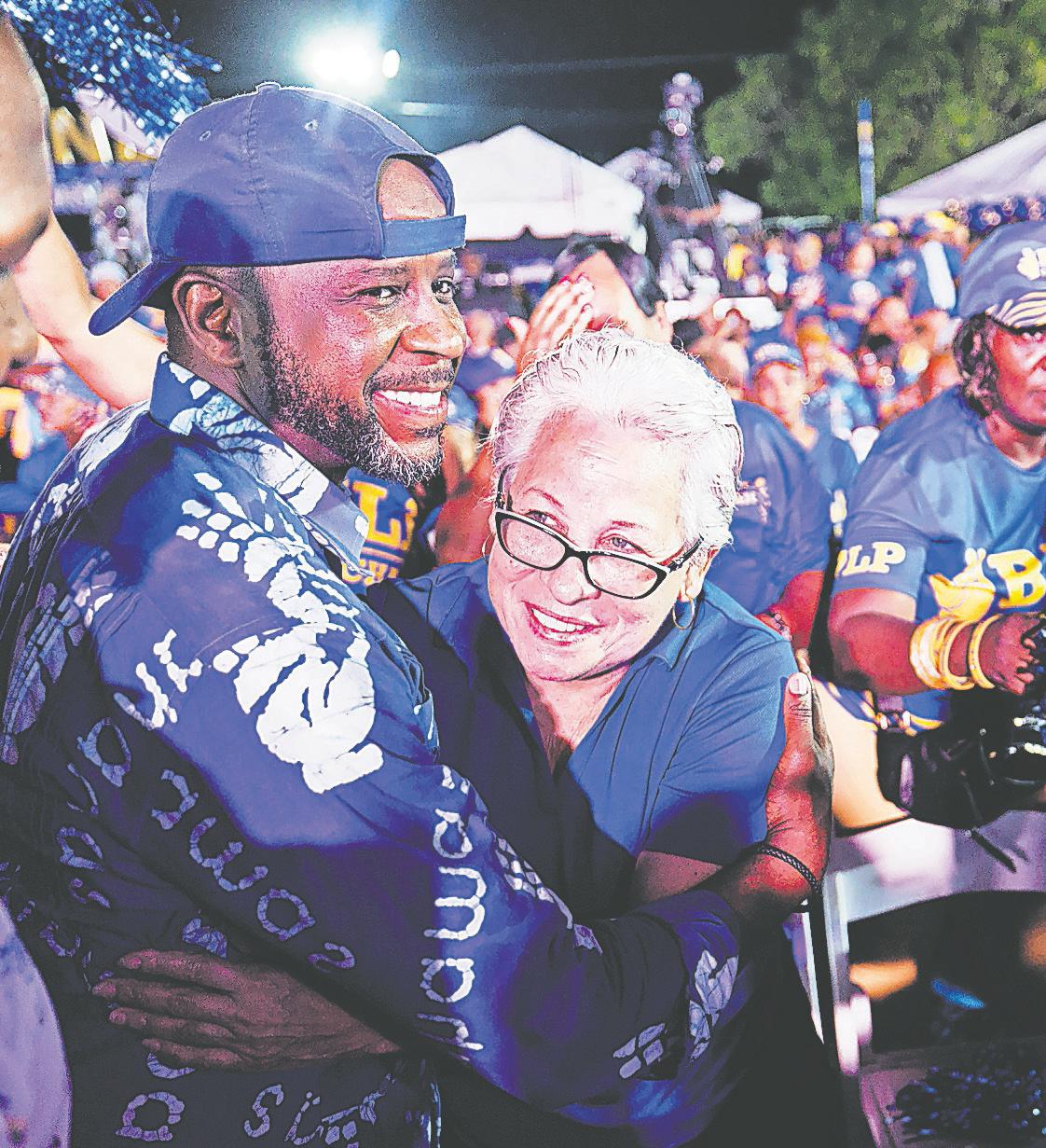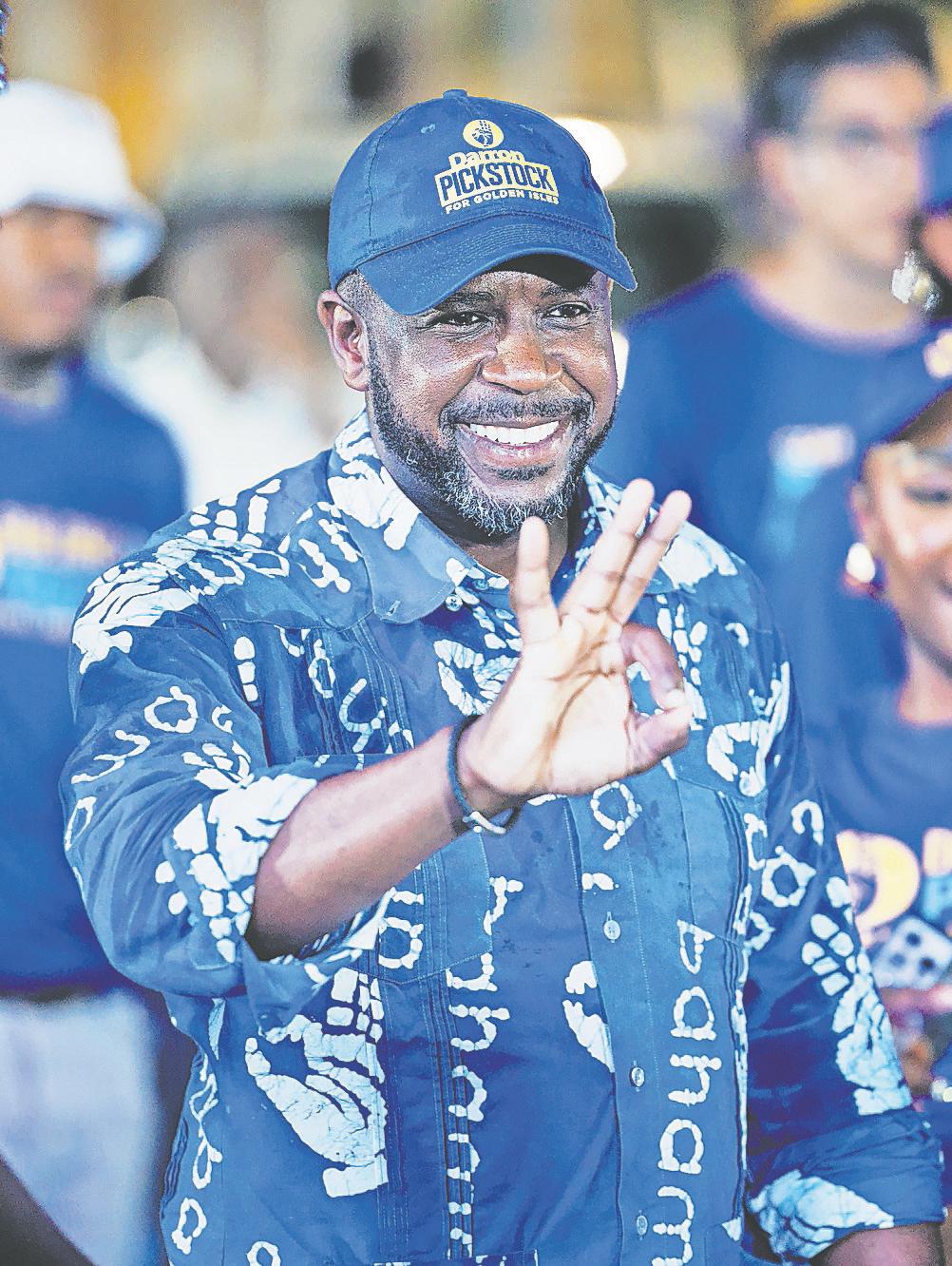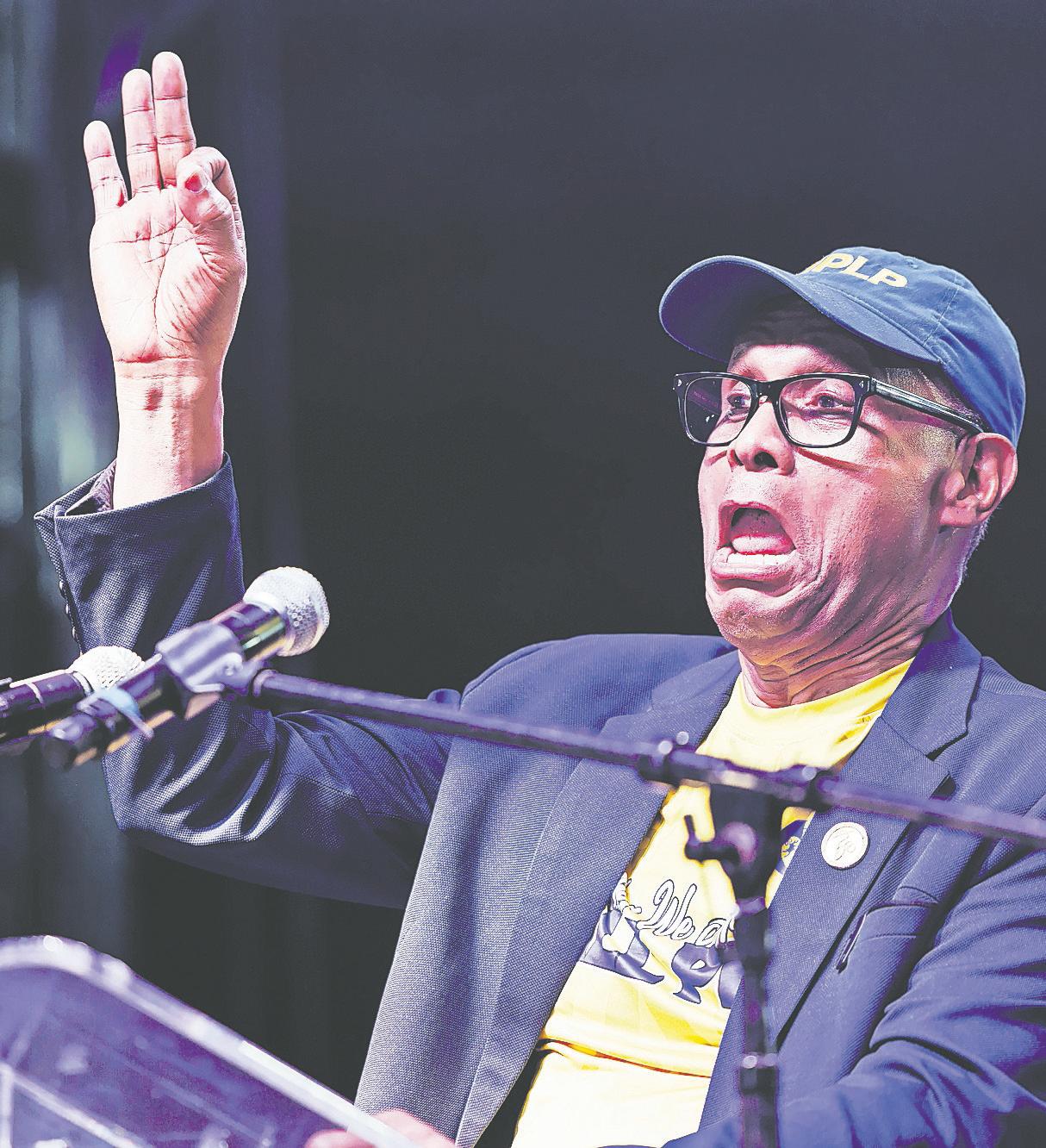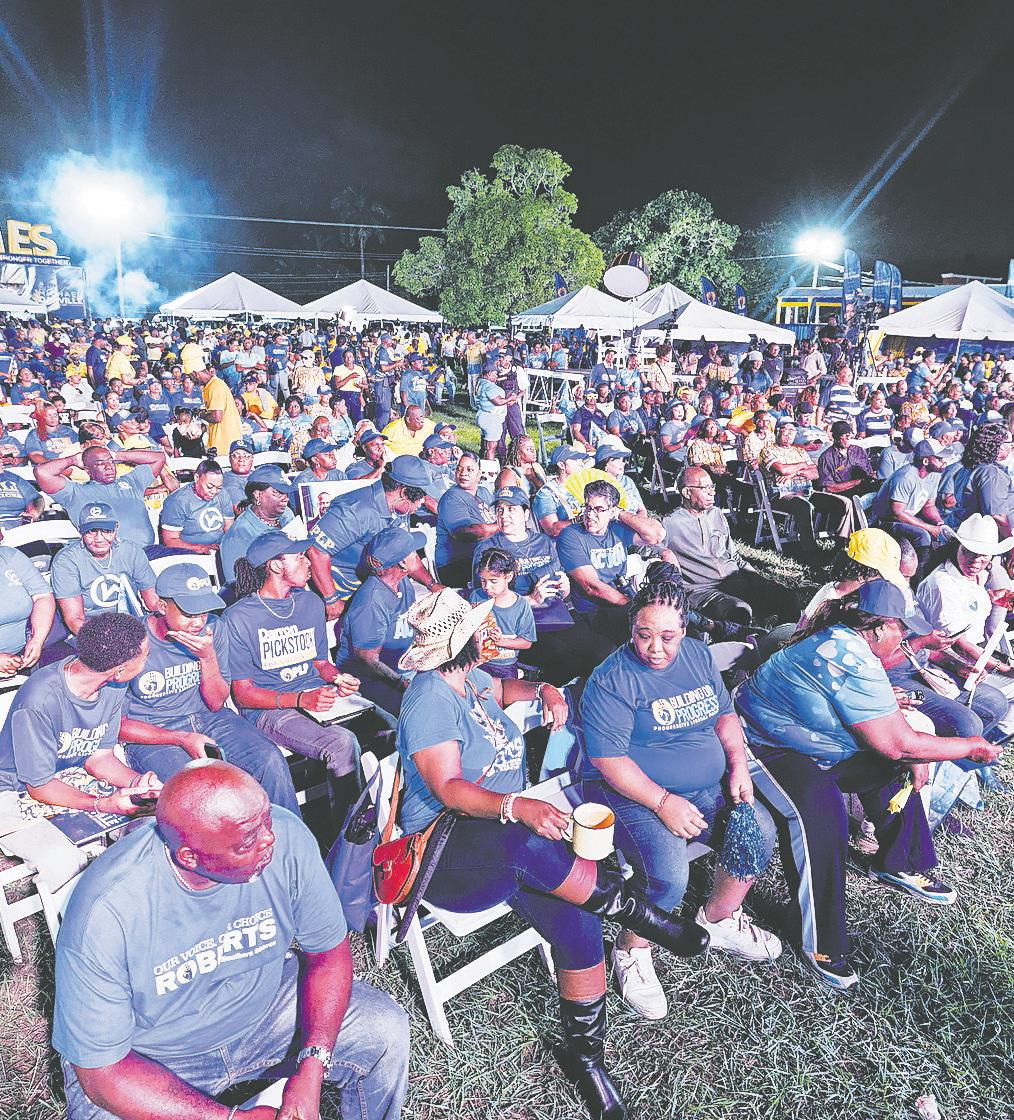




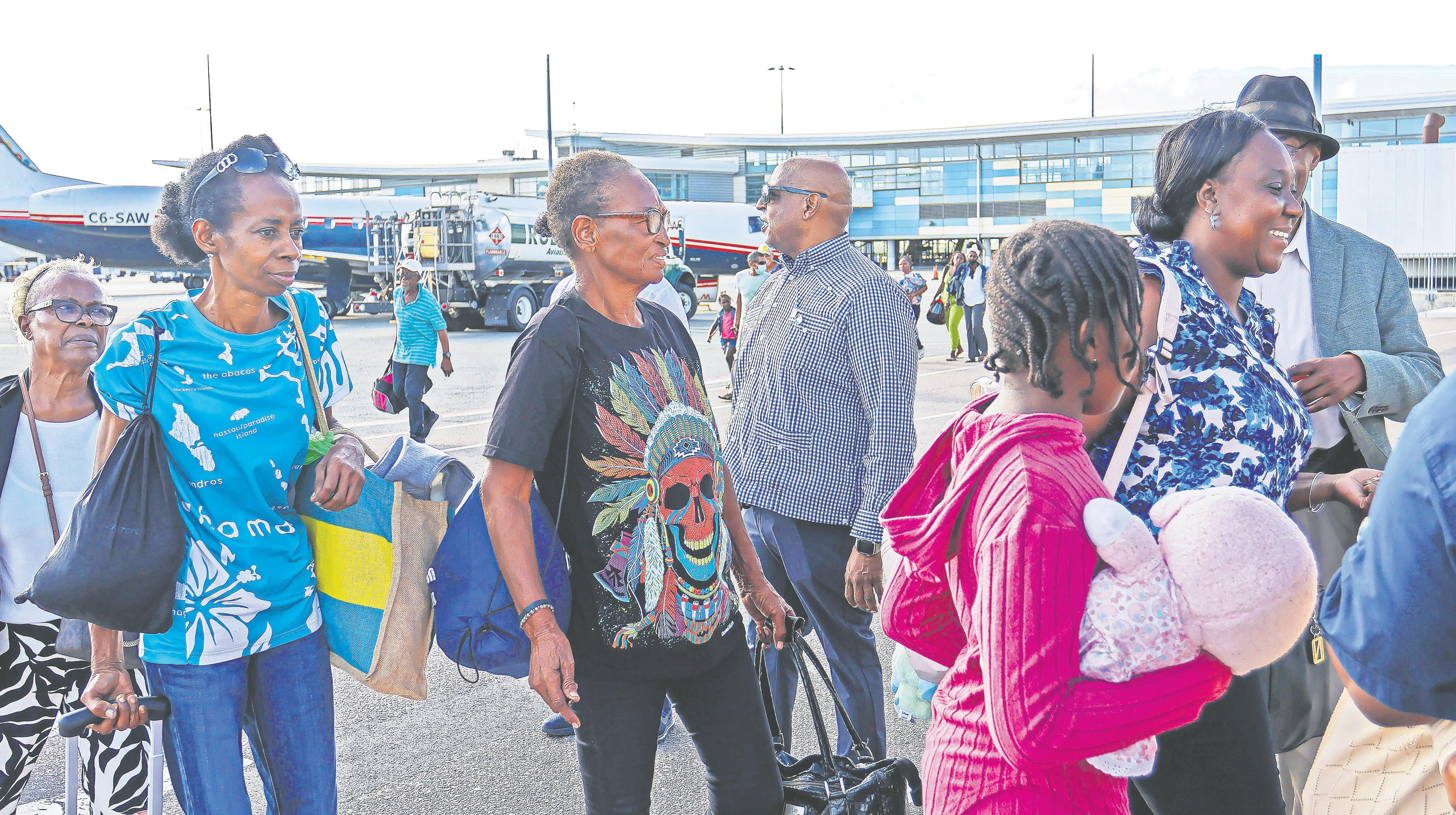
BAHAMIANS
1,400







BAHAMIANS
1,400
By LYNAIRE MUNNINGS
Tribune Staff Reporter
lmunnings@tribunemedia.net
MORE than 1,400 residents are being evacuated from the southeast Bahamas after Prime Minister Philip “Brave” Davis issued a mandatory evacuation order ahead of Hurricane Melissa, which is expected to hit Jamaica with catastrophic winds, fooding, and storm surge before heading toward Cuba and The Bahamas as a weaker storm. The evacuation order applies to Inagua, Mayaguana, Acklins, Crooked Island, Long Cay, and Ragged Island, with priority given to the elderly, the sick, and children, followed by able-bodied residents. The government said air and sea transportation are being provided for all evacuees being relocated to New Providence, where shelters and family accommodations have been arranged. Mr Davis said the evacuation order came after his briefng by the Disaster Risk Management Authority and the Bahamas Department of Meteorology on the latest forecasts for Hurricane Melissa.

He said the decision “is precautionary and designed to ensure that residents in the most vulnerable islands are relocated before conditions deteriorate. The safety of our people remains our highest priority.”
The Disaster Risk Management (Evacuation – Southeast Bahamas) Order, 2025, issued under section 56 of the Disaster Risk Management Act, took effect on October 27 and remains active until November 1, or until lifted by public notice.
SAFE - SEE PAGES TWO AND THREE
By
PAVEL BAILEY Tribune Staff Reporter pbailey@tribunemedia.net
A WEALTHY businessman escaped a mandatory prison term for frearm offences and was instead fned $1.4m yesterday after admitting to bringing 14 guns and more than 1,000 rounds of ammunition into The Bahamas aboard his yacht in Bimini last week.
...WHILE GOVT TO HELP FUND EXTRA STAY FOR JAMAICA WEDDING GUESTS WHO REMAINED
By LEANDRA ROLLE Tribune Staff Reporter lrolle@tribunemedia.net
THE Davis administration has given fnancial assistance to Bahamians who visited Jamaica for a wedding but did not leave in time and could not afford to extend their stay as Hurricane Melissa neared the island. Foreign Affairs Minister
By LEANDRA ROLLE Tribune Staff Reporter lrolle@tribunemedia.net
MEKHI Taylor, 20, one of two men killed over the weekend, often joked with his family that if anything ever happened to him, at least he had enjoyed his life. His older sister, K’nelle Taylor, said those were words he often repeated, especially
Fred Mitchell declined to comment yesterday.
However, his predecessor, Darren Henfeld, himself a Hurricane Dorian survivor, told The Tribune the 50-member group included residents of Abaco and Grand Bahama, who are now hunkering down at the Dreams Rose Hall Resort & Spa in Montego Bay. The group travelled to Jamaica to attend the wedding of Mr Henfeld’s brother. Melissa, now a powerful Category Five hurricane, was expected to hit Jamaica this morning with ferce winds and torrential rain before moving toward Cuba and the southern Bahamas. Jamaica closed its airports on October 26 as the system approached.
STAY - SEE PAGE THREE
NEWBORN BABY ALIVE AFTER BEING FOUND IN BUSHES

Murder victim joked with family how he enjoyed life GUNS - SEE PAGE SEVEN JOKED - SEE PAGE FOUR
By LEANDRA ROLLE Tribune Staff Reporter lrolle@tribunemedia.net
A NEWBORN baby boy, umbilical cord still attached and body hunched over, was found crying in bushes off Marshall Road yesterday morning as rain began to pour down, prompting a police investigation. Police said they were
BABY - SEE PAGE FIVE

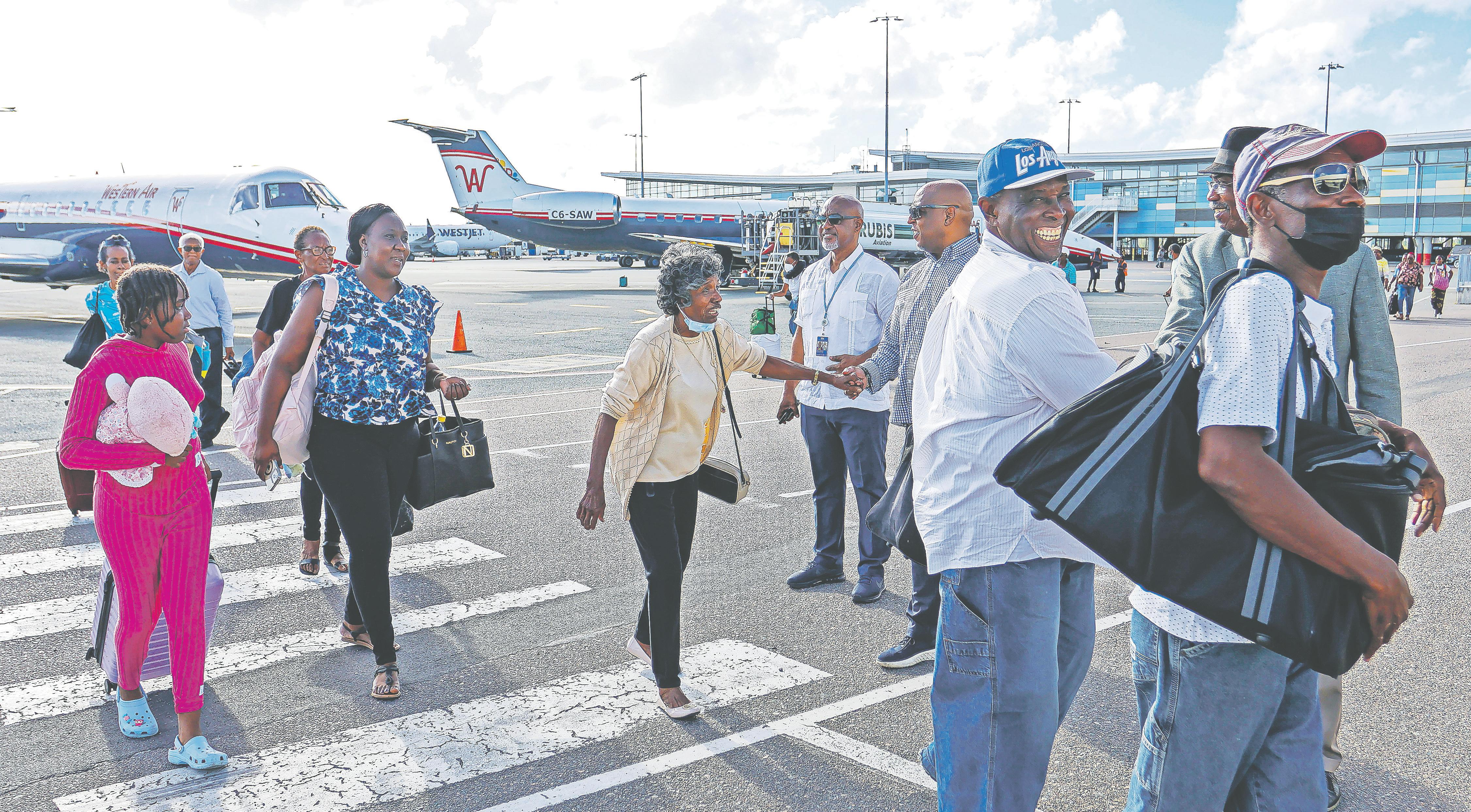



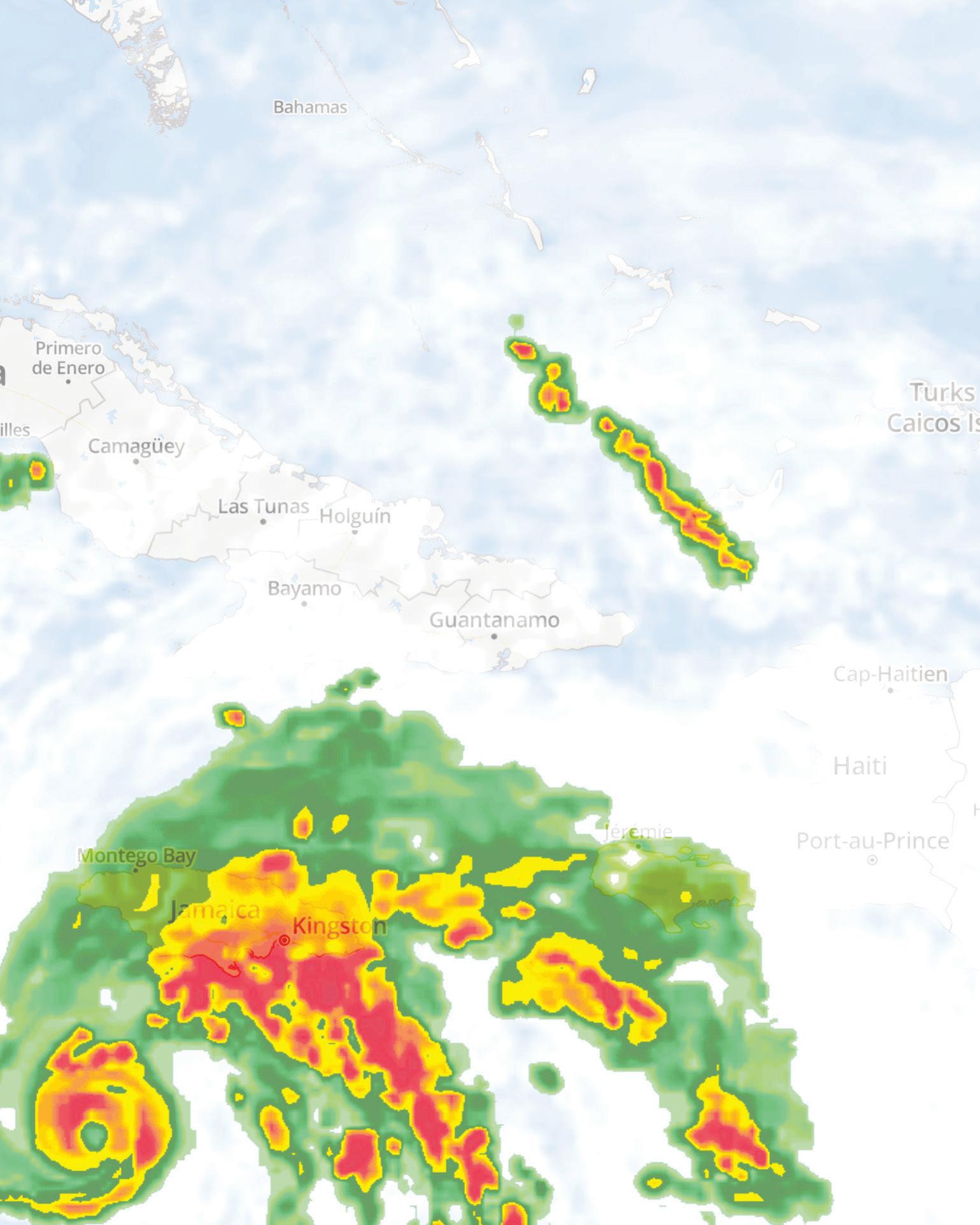

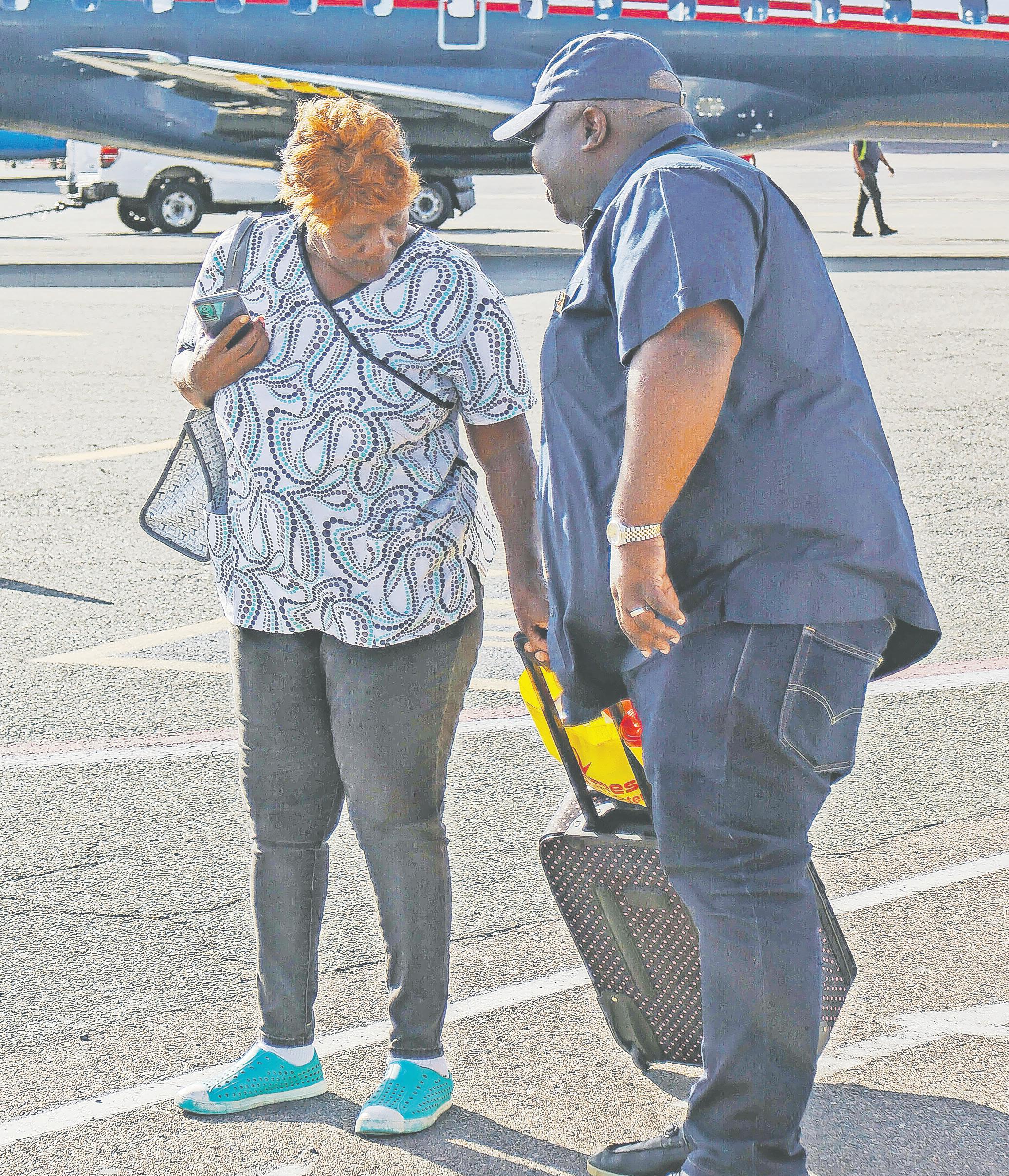
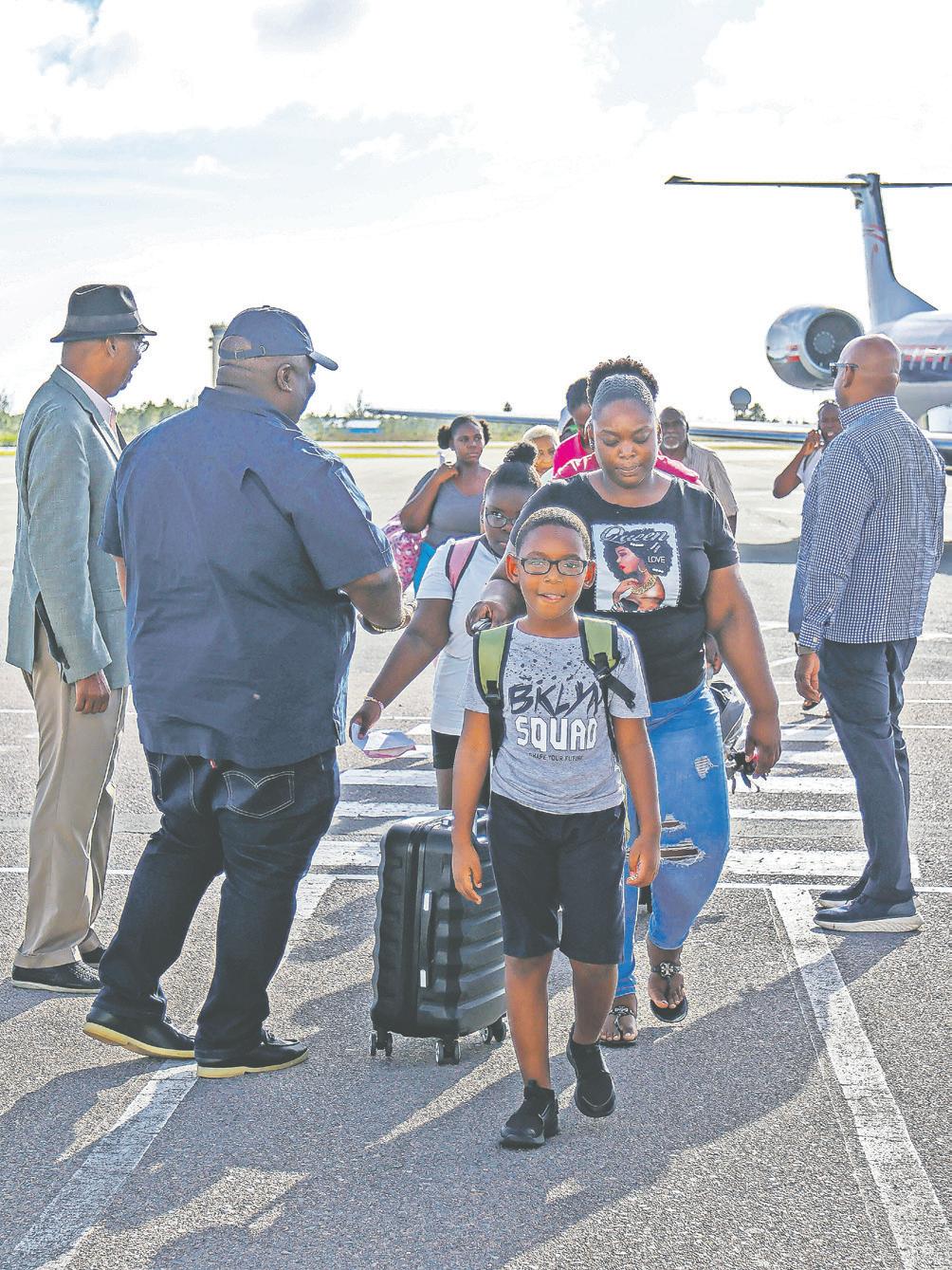
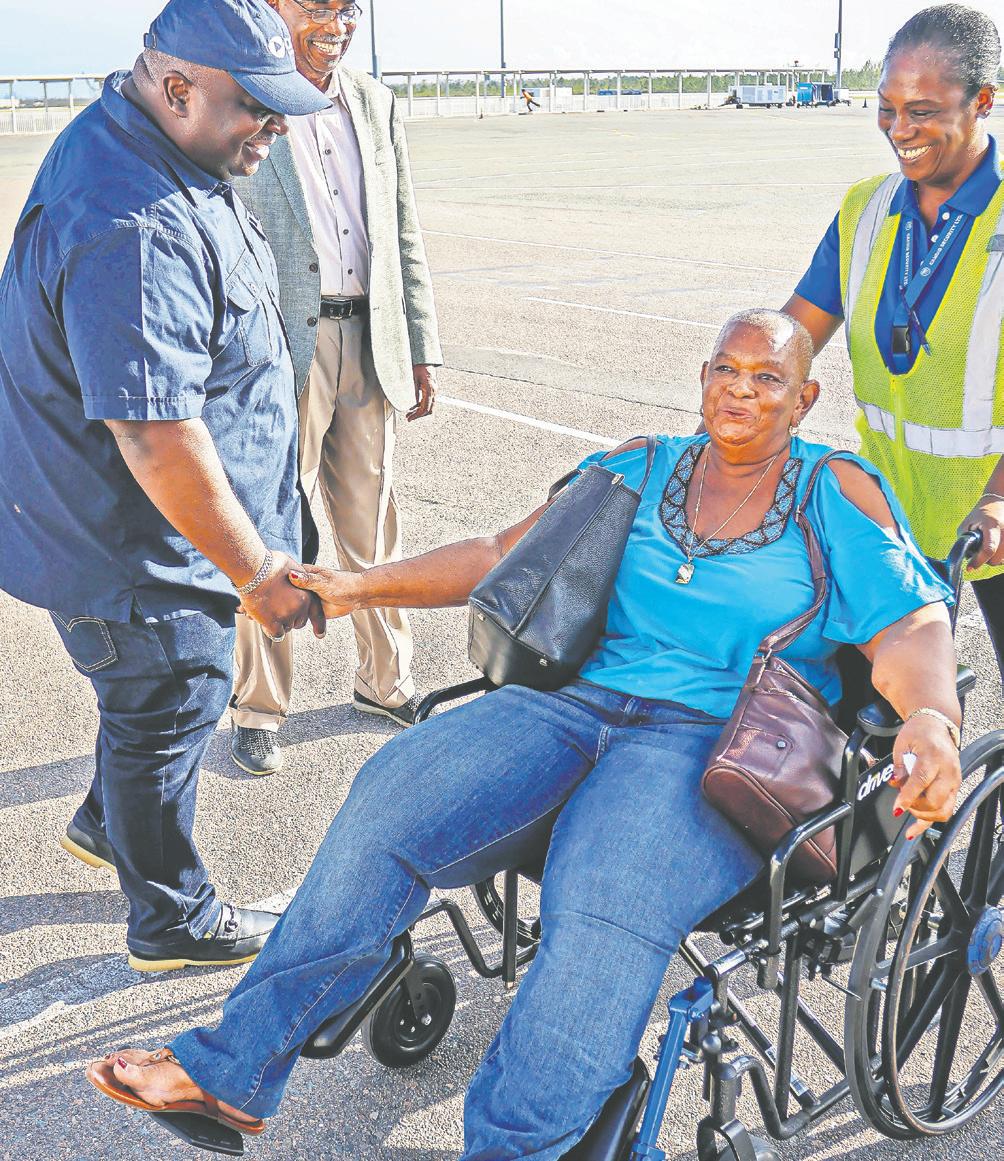
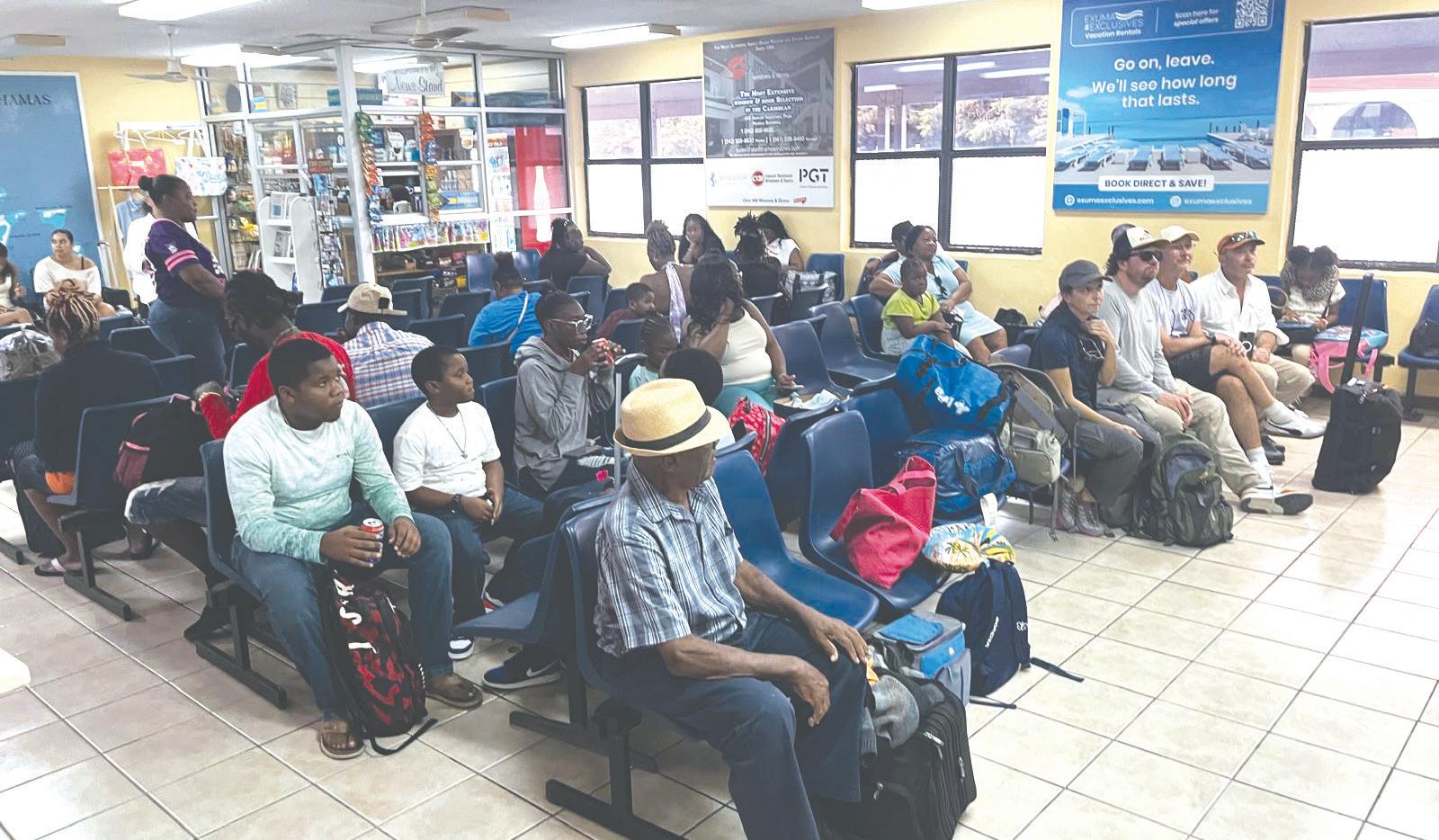
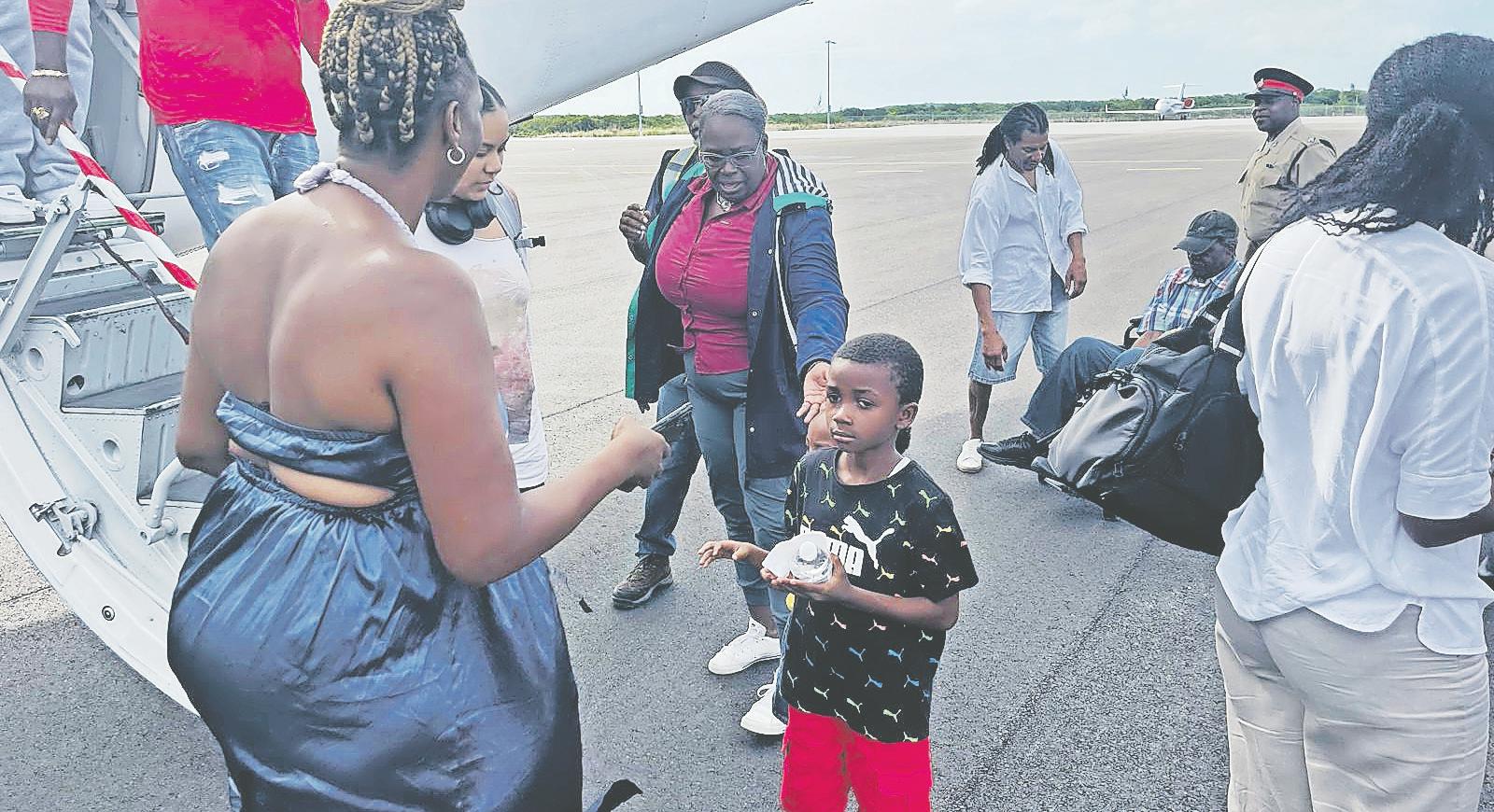
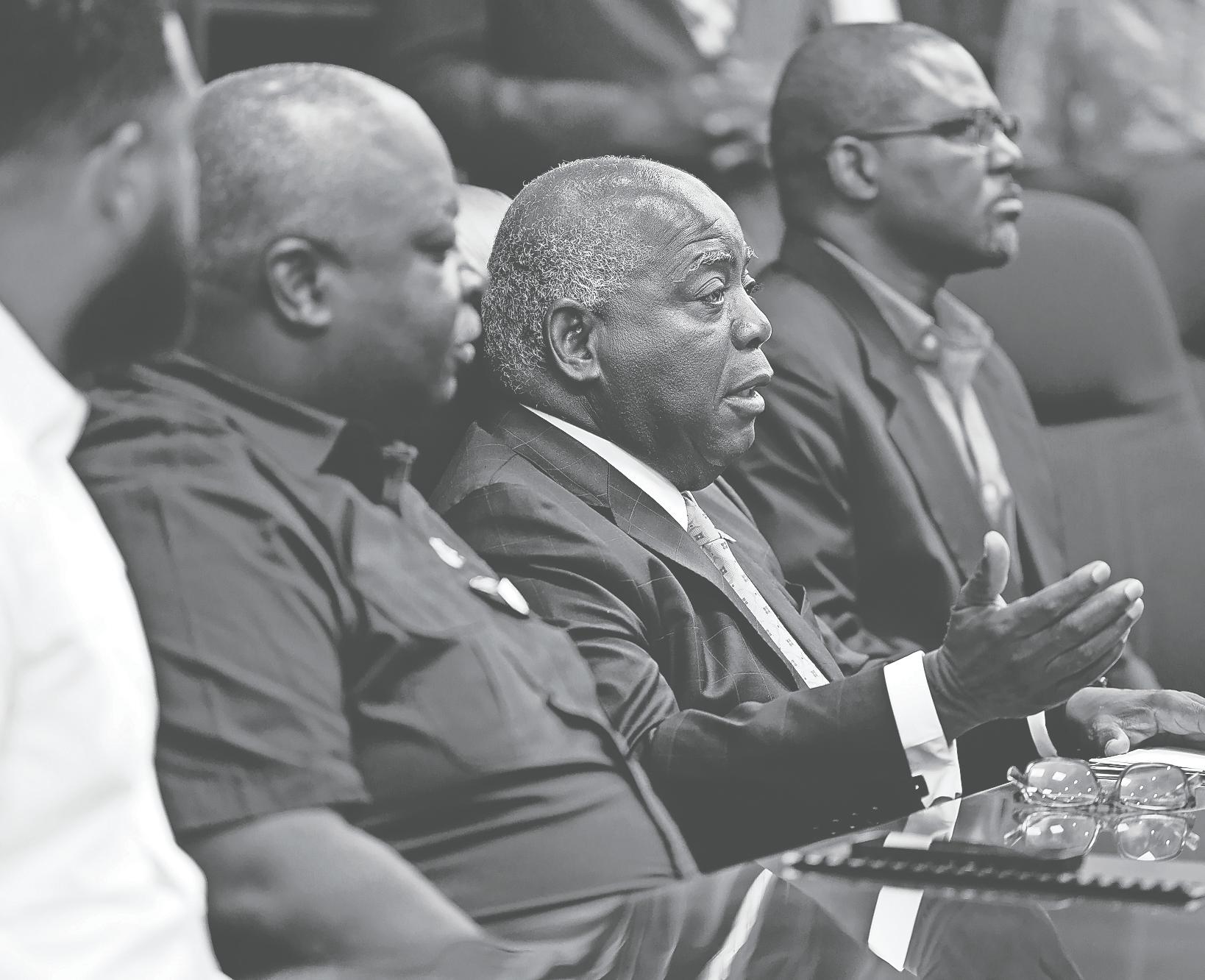
SAFE - FROM PAGE ONE
Mr Davis said forecasts show the storm’s outer bands will begin affecting the southeast Bahamas late today, bringing hurricane-force winds, heavy rainfall, and up to six feet of storm surge. Supplies, defence, and police force personnel have been pre-positioned, and all government agencies are operating under the National Disaster Response Framework.
He said relocating residents to New Providence was deliberate, as other Family Islands could also experience tropical storm conditions.
Deputy Director of Meteorology Jeffrey Green noted that up to press time, Hurricane Melissa was a Category 5 system with sustained winds of 175mph, moving northwest at three miles per hour. He warned that rainfall of up to ten inches is expected in the southeast Bahamas, with storm surge of four to six feet above normal dry ground possible.
Mr Green said the system will move near or over Jamaica, across southeastern Cuba, and into the southeast and central Bahamas by Wednesday. A hurricane warning is in effect for Exuma, Long
STAY - FROM PAGE ONE
Mr Henfeld said they remain in contact with Jamaican and Bahamian offcials, including Deputy Prime Minister Chester Cooper, who helped secure rooms for those unable to afford an extended stay. “That is very much appreciated by many in the group who did not (or) who were not prepared for an extended trip,” he said.
“We believe we’re in the best possible place to be in Jamaica for such an event, and we’re prepared as best as we can,” Mr Henfeld added.
“If I had to be stuck in a hurricane with any group of Bahamians anywhere in the world, I would pick the same group and change nothing about it.”
He said hotel offcials held briefngs yesterday to update guests on emergency protocols and advised them to pack overnight bags with essential items, documents, and medication in case of evacuation.
A “muster point” was designated in the hotel lobby for those who might feel unsafe in their rooms during the storm.
Mr Henfeld said the all-inclusive resort has promised to provide three
meals a day as long as the weather permits.
The group, he added, is leaning on each other for emotional support, especially those still haunted by memories of Hurricane Dorian. A pastor travelling with them is offering counselling to anyone feeling distressed.
“We’re here together,” Mr Henfeld said. “We’re sticking together as a group, as a family of friends and relatives and professionals together who worked with my sister in law, who’s a teacher, and friends of hers and friends of my brothers and our families from both sides of the island. These things have a way of bringing people together especially when you’re in a foreign land.”
Meanwhile, at the University of the West Indies’ Mona Campus, about 17 Bahamian students remained on site, while 76 others were evacuated on a Bahamasair fight on Friday.
Victoria Jean-Jacques, president of the Bahamian Students Association in Jamaica, said conditions were calm yesterday despite howling winds and light rain, adding that students had taken every precaution to prepare for the storm.
Island, Rum Cay, San Salvador, Cat Island, Acklins, Crooked Island, Long Cay, Mayaguana, Inagua, and the Turks and Caicos Islands. Minister of State and Disaster Risk Management Authority Managing Director Leon Lundy said evacuation fights began early yesterday and continued into the night.
The frst groups of evacuees from Inagua and Acklins arrived safely in New Providence and were processed at the Kendall GL Isaacs Gymnasium before being moved to shelters, including the Nassau Village Community Centre, New Bethlehem Baptist Church, Remnant Tabernacle
Church of God, Epworth Hall, New Providence Community Centre, Fox Hill Community Centre, and the Regions Hotel.
He said evacuation fights will continue through today, but there will be a cut-off point after which all fights and emergency operations will be suspended until the all-clear is given. Disaster Risk Management Authority Director Aaron Sargent said fve aircraft will depart New Providence beginning at 5am today, with more to be added if needed.
So far, more than 370 people have been evacuated, but authorities expect
the number to exceed 1,400 as residents comply with the order. Mr Sargent warned that once operations pause for the storm’s passage, no further assistance can be provided until the all-clear is issued.
Although Hurricane Melissa is expected to hit The Bahamas as just a Category One storm, Mr Sargent defended the evacuation order.
“It’s not just as simple as a category two,” he said. “If you look and we go back to just as recent as Tropical Storm Imelda, which brought eight to ten inches of rain, you would appreciate that in the Southeastern Bahamas, it is
low lying, with the exception of Ragged Island and a Cat two could pose immense challenges with the capacity being lower than what it is in the capital and Grand Bahama, or the coping capacity that are in the much more developed islands.” Mr Davis, meanwhile, extended his prayers to Jamaica, the Dominican Republic, Cuba, and Haiti, which are already enduring the storm’s impact.
“We stand with them in solidarity and in prayer,” he said.
“The people of The Bahamas know all too well the fear and uncertainty that come with a storm of this strength.”

By DENISE MAYCOCK Tribune Staff Reporter dmayock@tribunemedia.net
RESIDENTS of East Grand Bahama are demanding a stronger police presence and urgent safety upgrades along the Grand Bahama Highway after a deadly weekend crash claimed the lives of two men and left a woman seriously injured.
The victims — Christopher Smith, a chef at The Garden of the Groves, and Mozen Selemfort, a boat captain at Statoil — died at the scene early Saturday morning after their vehicles collided on the highway between 6am and 6.30am. Smith’s sister, Roseleen Judy Smith, who was driving the Chrysler they were in, was critically injured and remains in stable condition at the Rand Memorial Hospital. Police said Mr Selemfort’s white Honda veered into the opposite lane and collided with Ms Smith’s car.
The crash has intensifed calls for better traffc control as residents link a surge in speeding, overtaking, and reckless driving to the recent opening of Celebration Key. They say traffc has soared since the cruise port began operations, transforming the once-quiet eastern stretch of the highway into a high-risk zone.
Freetown resident Glenroy Cooper said the situation has grown increasingly dangerous. “I do have a lot of concern. I’ve been living here all my life, and since this new port opened, you have persons coming into the area and they have no regard for themselves and others,” he said.
He said drivers frequently overtake at high speeds, particularly in the early morning, creating panic for local motorists. “My wife is even afraid to drive me to Freeport now because of how motorists are overtaking. There’s no regard at all.”
Mr Cooper said police patrols at peak hours could deter reckless driving. “They need more police presence in the area. Around 6.00 in the morning, if a traffc car goes there with its lights on,
people will be more cautious. Once they see police monitoring, they will slow down,” he said. The tragedy hit especially close to home for Mr Cooper, who revealed that his nephew, Christopher Smith, was one of the men killed in the crash. “I had to run off the road on three different occasions going into Freeport. Cars come right on you, and there’s nothing you can do but pull off. You could be right, but you could be dead,” he said. Another Freetown resident, McDonald Cooper, said the incident brought back painful memories of losing his wife in a similar accident 25 years ago on the same highway.
“I feel very bad because I had a wife who got killed in a car accident, a similar type of accident, just about three miles east of where Celebration Key is now. It was like déjà vu,” he said. He said traffc from Celebration Key has created severe safety challenges during morning and evening rush hours. “From High Rock all the way into Freeport, especially in the mornings and evenings, there’s a serious concern. These motorists overtake and drive with high beam lights — sometimes you have to stop or run off the road,” he said.
He also complained that heavy equipment and dump trucks from nearby industrial sites often speed through residential zones.
“We have children and people living right on the main road. There’s no kind of consideration. The police need to come out East and start writing these people up. Once that happens, the whole attitude will change,” he said. While he praised the installation of cat eyes on the highway, he said glare from high beams and neon lights makes driving treacherous.
“You can’t even see the cat eyes because you’re blinded by the lights. Those blue and neon lights are against regulations. The police need to deal with that,” he said.
Freddy Laing Jr, District Superintendent for the Zion United Baptist Convention
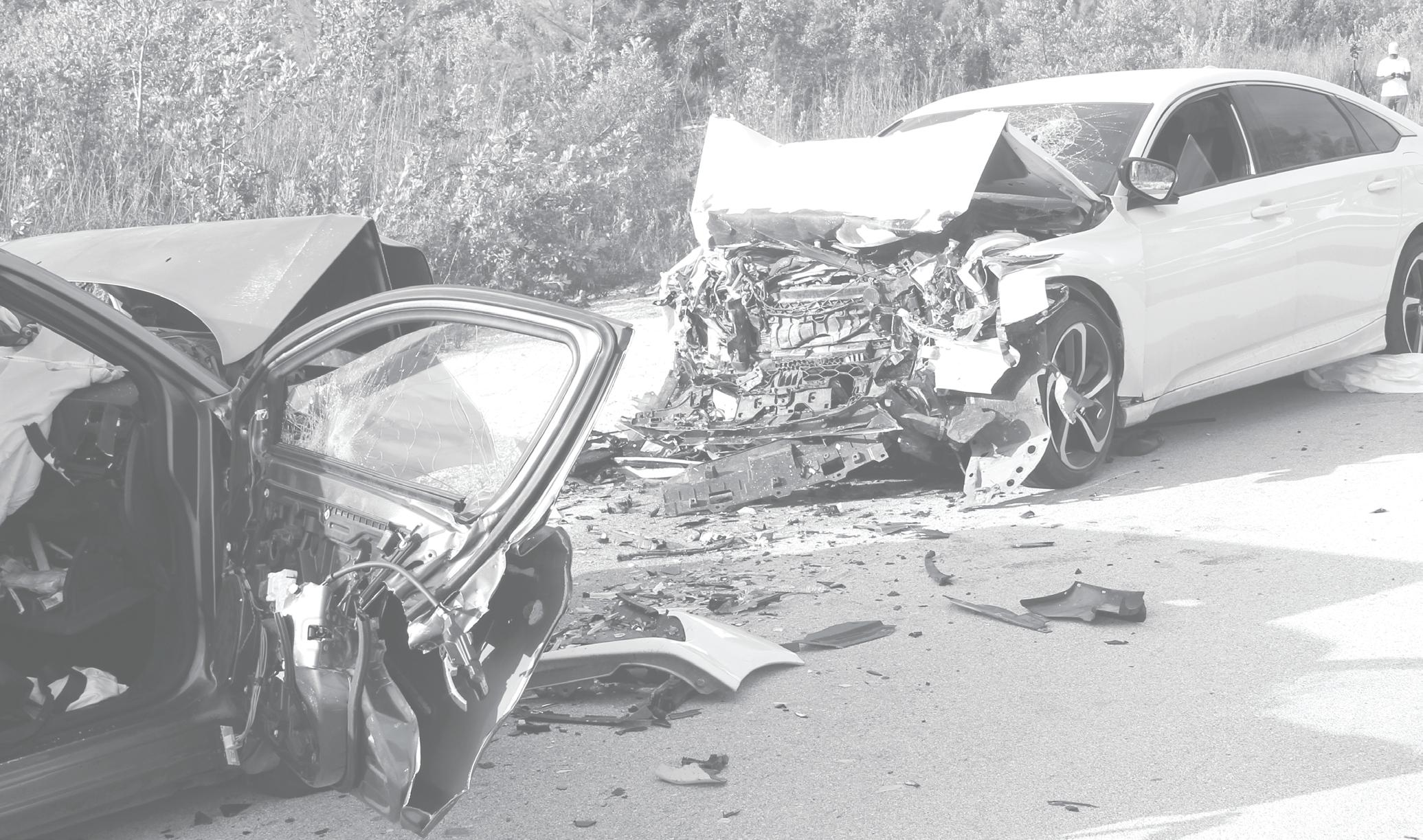
THE aftermath of the accident in Grand Bahama that left two men dead.
Photo: Vandyke Hepburn
and a resident of East End, said road lighting and maintenance are urgently needed.
“It is rather unfortunate and heartbreaking what happened on Saturday morning. But one of the major concerns is that the road is very dark at night,” he said.
He added that proper lighting was never restored after Hurricane Dorian, making night-time driving hazardous.
“We need more lighting in the entire East Grand Bahama area,” he said.
Mr Laing said the opening of Celebration Key has also brought unusual traffc congestion during early hours.
“From around 4 or 5am now, there’s traffc. We never had traffc like that before. So yes, we need more police presence, and motorists need to drive with more due care and attention,” he said. He urged authorities to address potholes and improve visibility along the highway.
“Lighting is crucial. Motorists must be more courteous and look out for each other,” he added. Saturday’s crash pushed the national traffc fatality count to 53 for the year.

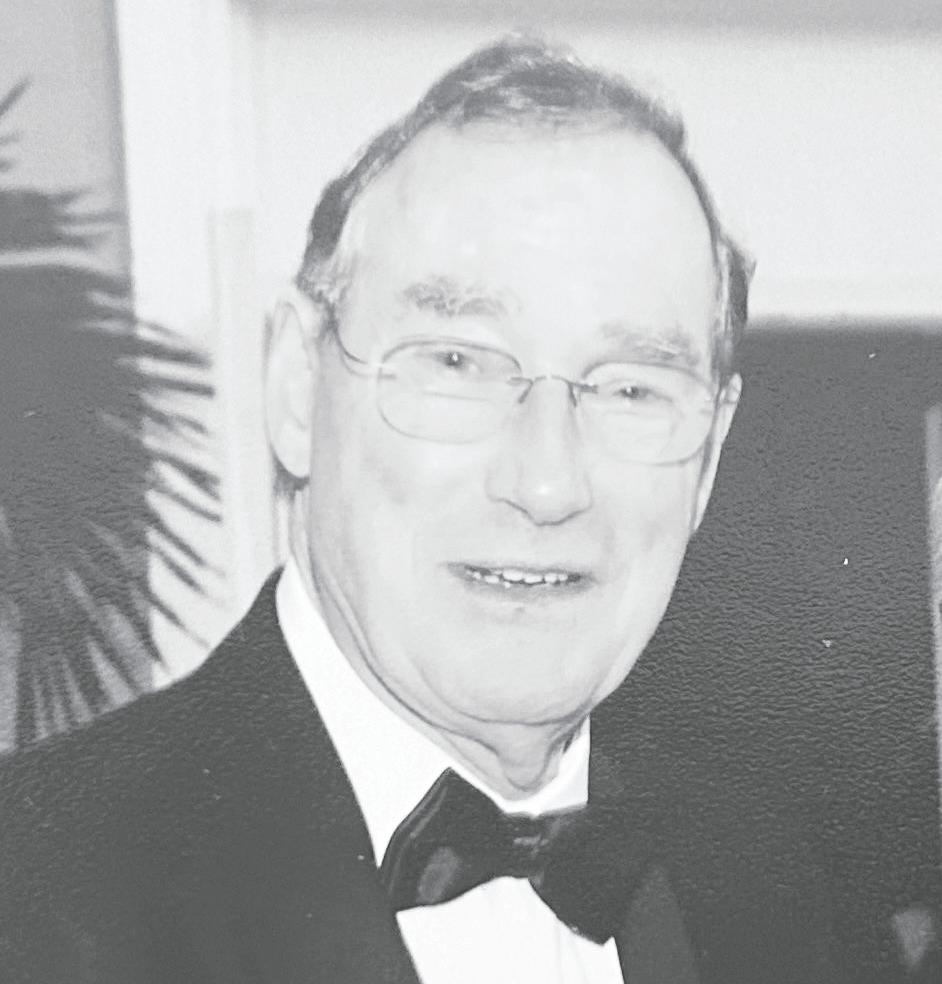
died peacefully in his sleep on October 23rd, 2025. He was born, in the Wirral, England, to William and Nancy Hillier on the October 12th 1934 shortly after his twin brother Joseph. He made the Bahamas his lifelong home, arriving in Nassau in 1957 at the age of 22. He built lasting friendships and a distinguished career, first as a banker and then an entrepreneur. He was instrumental in the development of Butler & Sands, The Perfume Bar, Bristol Cellars and Bijoux Terner. Beloved husband of Gerry, devoted father to Aidan, Piers, and Philip, and a proud grandfather. He embraced life with a quiet determination and great sense of humour. Leaving a legacy of love and happiness, his warmth and generosity will be remembered by all who knew him.
A memorial service will be held for Philip Hillier at St. Paul’s The Apostle Roman Catholic Church, Western Road, Lyford Cay, Nassau, N.P., The Bahamas, on Friday 31st October, 2025 at 12:00 noon. Father Anselm Russell will officiate.
Cremation was held.
Arrangements by Kemp’s Funeral Home Limited.
‘IF SOMETHING HAPPENS TO ME SAY AT LEAST I HAD FUN’

JOKED - FROM PAGE ONE
to his older brothers who cautioned him about his frequent partying.
“From he turned 18, he just was into party and a good time,” she said, “and whenever we tell him about it, he always just a crack joke bout at least he had fun, if something was to happen to him, he’d say, ‘at least I had fun’.”
Taylor, a beach attendant, was gunned down early Saturday while standing with a group of people in a parking lot on University Drive. Police said a Japanese vehicle pulled up before 2am and its occupants opened fre.
His family believes he was not the intended target, but was caught up in the crossfre.
“He never bothered. He was never into no gang violence,” his sister said, describing him as a hustler. “He could’ve gone into any area with his head held high.”
Ms Taylor said hours before the shooting, her brother had dinner at Carnivale Bahamas with his younger brother and friends. After dropping off a neighbour, he returned home briefy before heading out again, promising to come back, which he never did.
“I was sleeping and my other younger brother, he wake me up and say Mekhi get shoot,” she said.
“I barely even made it to the hospital. I had to stop by my grammy house because my belly just break down on me.”
She said the two shared a close bond.
In a statement released over the weekend, Taylor’s workplace, The Blue Zone Experience, described him as a hard-working, respectful man — an irreplaceable asset to the business.
“For those who had a chance encounter with Mekhi they knew that he was a one of a kind soul that made the day better,” the company said.
“He will forever be in our
hearts and eternally miss but we are also grateful for his life.” Taylor’s death was one of two fatal incidents over the weekend.
The second victim was identifed by friends as 25-year-old Philip Lockhart, a twin and restaurant server. He was killed following a brawl at Arawak Cay Sunday morning. His best friend of 16 years, Iranique expressed shock and grief over the loss.
“Philip was an extraordinary person, one of the most caring persons I’ve eveyrcame across in my entire life,” she told The Tribune yesterday. “If it wasn’t for him, I wouldn’t have gotten through many of my heartbreaks. He was my shoulder to cry on, my best friend, my diary.” Police have detained a 29-year-old man in connection with his death.
The latest homicides bring the country’s murder count to 70 for the year, according to The Tribune’s records.
By LYNAIRE MUNNINGS
Tribune Staff Reporter lmunnings@tribunemedia.net
THE Court of Appeal has ruled that neither the government nor Bahamian resident Dahene Nonard will be required to pay legal costs in a long-running citizenship case that became controversial after a retired Supreme Court justice issued a ruling nearly three years after leaving offce.
The ruling was delivered by Justice Crane-Scott, JA, with Chief Justice Sir Ian Winder, Justice Charles, Justice Smith, and Justice Turner all concurring. The panel determined that fairness and justice demanded that both sides bear their own costs, stating that “the justice of this particular case dictates that there be no order as to the costs of the appeal.”
The case originated in 2013 when Ms Nonard applied to be registered as
a citizen of The Bahamas.
After years without a decision, she fled for judicial review and constitutional relief on November 7, 2018, arguing that the government had failed to process her application properly. The matter was heard in February 2021, but the presiding judge reserved her ruling. It was not until August 2, 2024, three years and fve months later, and nearly three years after she had retired, that the judgment was fnally delivered. The government appealed, contending that the retired justice lacked constitutional authority to issue a ruling after demitting offce.
In July 2025, the Court of Appeal agreed, fnding that the August 2024 judgment was unconstitutional, invalid, and a nullity. The court set aside the ruling and remanded the case to the Supreme Court for rehearing by a sitting judge. However, the cost
question remained unresolved until now.
The government, represented by attorney Kayla Green-Smith with Adele Mangra and Nevado Frazer, argued that as the successful party, it was entitled to costs under the general rule that the losing side should pay. Ms Nonard, represented by Frederick Smith, KC, Dawson Malone and Raven Rolle, urged the court to make no order on costs, arguing that the delay and the resulting appeal were caused solely by the judicial system.
Justice Crane-Scott, delivering the court’s ruling on costs, agreed that both parties were innocent victims of the delay.
“Obviously, neither the appellants nor the respondent are responsible for the delay which transpired after the learned judge reserved her decision in February 2021,” the court said. “The conduct of the proceedings after the
judge reserved her decision clearly rests squarely on the shoulders of the Judiciary as an arm of the Crown.”
The court stressed that, while the government technically prevailed on appeal, its victory rested on the fnding that the judgment was unconstitutional, not on the merits of its legal arguments.
“As a result of the learned judge’s unconstitutional act, the respondent’s proceedings have been remitted to the Supreme Court for rehearing and determination before another judge,” she wrote.
“It would be unconscionable if the usual costs rule were to be applied and the respondent were, through no fault of hers, to be fxed with costs of the appeal.”
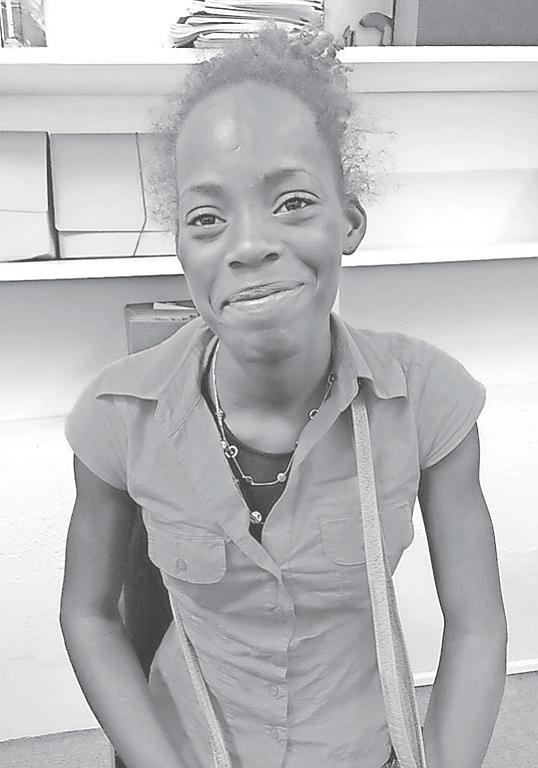
Justice Crane-Scott noted that section 30(1) of the Supreme Court Act gives judges discretion over costs, and Rule 24(5) of the Court of Appeal Rules allows the appellate court to make any order it considers just. The court referenced previous rulings such as Scherer v Counting Instruments Ltd, which
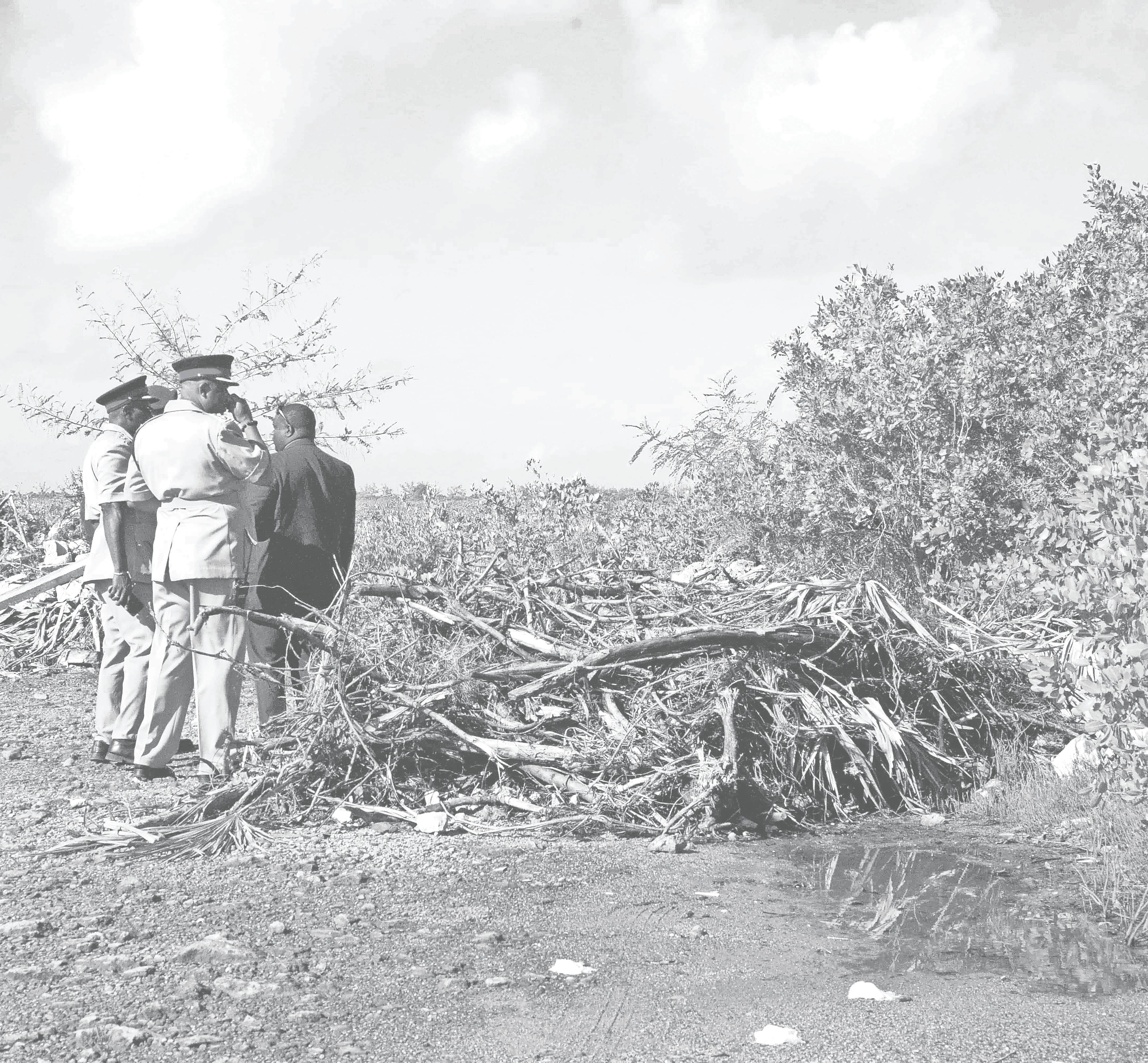
alerted to the scene shortly after 9am by a passerby who heard the cries. That passerby, Acharro Gaitor, told ZNS News he was in the area when he discovered the infant.
Emergency medical services were called and transported the baby to hospital. Police later confrmed that he was in good health.
Chief Superintendent Darron Nixon, officer in charge of the Carmichael police station, urged the baby’s mother to come forward, saying there
“I started praying,” he said. “That’s the frst thing I started doing, and my prayer is that child will live and represent the kingdom of God.”
are many resources available for women in crisis.
“Mothers should not have to endure this kind of trauma,” he said. “It is a trauma situation, and she needs to know that there is help for this, and we’re not blaming her, and we hope that she would come forward to us and let us know that it is her child. The child is still alive, and there’s help for this situation.”
By PAVEL BAILEY Tribune Staff Reporter pbailey@tribunemedia.net
A 31-YEAR-OLD man was remanded to prison yesterday after being accused of the murder of Lauren Saunders, a pregnant mother whose decomposing body was found last week.
Prosecutors allege that Reuben Cartwright Jr killed Saunders, 30, on October 19 in New Providence.
Her death shocked the nation and left many reeling from the brutality of a crime against a young mother of two.
Ms Saunders was reported missing by relatives at 11.30pm on October 19.
The silver Jeep she had been driving was later found abandoned off Coral Harbour Road with a fat tyre.
Her handbag, shoes, and other personal items were found inside the vehicle, according to police and family members.
Police found the victim’s body, which was decomposing, last Wednesday in a bushy area off Munnings Road after days of extensive searching.
Members of both the victim’s and the accused’s families were present in the
packed courtroom yesterday morning as tension flled the air.
Cartwright was not required to enter a plea when he appeared before Chief Magistrate Roberto Reckley. The matter will proceed to the Supreme Court by way of a voluntary bill of indictment.
He was informed of his right to apply for bail through the higher court. He was remanded to the Bahamas Department of Correctional Services until the service of his voluntary bill of indictment on January 22, 2026.
Inspector Deon Barr prosecuted the matter, while Ian Cargill represented the accused.

NULLIUS ADDICTUS JURARE IN VERBA MAGISTRI
“Being Bound to Swear to The Dogmas of No Master”
LEON E. H. DUPUCH
Publisher/Editor 1903-1914
SIR ETIENNE DUPUCH, Kt., O.B.E., K.M., K.C.S.G., (Hon.) LL.D., D.Litt .
Publisher/Editor 1919-1972
Contributing Editor 1972-1991
RT HON EILEEN DUPUCH CARRON, C.M.G., M.S., B.A., LL.B.
Publisher/Editor 1972-
Published daily Monday to Friday
Shirley & Deveaux Streets, Nassau, Bahamas N3207
TELEPHONES
News & General Information
(242) 502-2350
Advertising Manager (242) 502-2394
Circulation Department (242) 502-2386
Nassau fax (242) 328-2398
Freeport, Grand Bahama (242)-352-6608
Freeport fax (242) 352-9348
WEBSITE, TWITTER & FACEBOOK
www.tribune242.com


HURRICANE season can be stressful for anyone near the potential path of a storm, as powerful winds and heavy rain can cause widespread damage, cut power for days or weeks and otherwise upend people’s lives. Smart preparation ahead of time can reduce that stress and keep you safer. Emergency management officials say good practices include looking around your home for potential hazards, considering how you might handle evacuation, and putting together a kit of essential supplies.
How to prepare a home for a storm
Anything in the backyard that isn’t tied down, such as furniture and barbecue grills, should be secured or brought inside so it doesn’t become a projectile that can come through a window, said Shawn Schulze, regional CEO for the American Red Cross Texas Gulf Coast Region.
If possible, board up windows and place important documents such as passports and birth certificates in a waterproof case or even a Ziploc bag, Schulze said. That will prevent damage and make documents easier to locate in a quick evacuation.
Some preparation needs to happen well before a storm is imminent. That includes trimming or removing dead or weakened tree limbs and shrubs that hang over homes to lessen potential damage from high winds, said Mistie Hinote, a spokeswoman for the Texas Department of Insurance.
Hinote also urged people to review what type of insurance coverage they have and to make a home inventory of their possessions by taking photos of them in case an insurance claim needs to be made after a storm.
Brian Mason, director of Houston’s Office of Emergency Management, recommends that homeowners get their roofs inspected before each hurricane season and know how to turn off their utilities in case of damage.
Have an emergency kit
Every family should have an emergency kit with supplies to meet its basic needs.
For people who stay, a kit should
include at least 1 gallon (3.8 liters) of water per day per person, with enough for up to seven days, Mason said. One way to have enough water is to fill a bathtub.
People should also have enough nonperishable food for up to seven days, as well as flashlights, batteries, candles, medications, portable power banks or other power sources, and a radio that runs on batteries.
Pets should be included in preparations, including bringing them inside ahead of a storm, and having enough food, water and necessary medications for up to seven days, Mason said.
Parents should also include something to entertain their kids, such as games or coloring books, because likely power outages after a hurricane mean there won’t be internet and cellular service, and “nothing’s more challenging for a family than kids that are bouncing off the walls because they’re bored,” Mason said.
“If you decide to stay, you need to make sure that you can be self-sufficient for days to weeks, depending on how long it takes for power to be restored,” Mason said.
Have an evacuation plan
If people decide to leave ahead of a storm, they should also prepare an emergency kit with enough supplies to get to their destination, officials said.
Before a storm arrives, people should know their evacuation routes are and have backup routes in case roads get congested, Mason said.
Officials recommend fueling vehicles if a storm is approaching. People with electric vehicles should make sure their routes have charging stations along the way, he said.
Schulze said it’s natural for people to be afraid when a hurricane is coming, but having a plan in place and letting loved ones know you’re prepared will go a long way to easing fears.
“Think about what the worst could be and prepare for that and you’ll always be ready for what comes your way,” Schulze said.
By JUAN A LOZANO Associated Press
EDITOR, The Tribune.
I WRITE as a concerned Bahamian who believes public office must be earned by record and reputation, not rewarded by proximity to power. The government’s decision to appoint former Commissioner of Police Clayton Fernander as Consul General to Toronto is not a routine posting. It is a signal. And the signal is troubling.
Mr Fernander’s tenure as Commissioner was marked by instability and eroded confidence. During that period, a senior officer, Chief Superintendent Elvis Curtis, was arrested in the United States and indicted for drug trafficking and firearms offenses. Fourteen officers reportedly failed to appear for serious criminal matters, exposing breakdowns in command, communication, and accountability. Residents also raised concerns about alleged sexual misconduct by officers and how such complaints were handled. These events did not occur in isolation. They reflected a system that tolerated impunity and blurred the lines between professional policing and political convenience.
A foreign posting carries more than ceremonial weight. A Consul General protects Bahamian citizens abroad, promotes trade and investment, and represents our national values. That role demands unimpeachable judgment, clean governance practice, and the confidence of the public.
Elevating a former Commissioner whose leadership coincided with such failures sends the wrong message at home and overseas. It tells victims who sought justice that accountability is optional. It tells honest officers who risk their lives that standards are flexible. It tells young Bahamians that merit can be bypassed. Defenders will say the appointment is lawful and that the former Commissioner has served the country for many years. Service deserves respect. But respect for service does not erase the need for scrutiny, especially when the portfolio is diplomatic and the stakes include our international credibility. We need to reset how these decisions are made. Publish clear selection criteria for diplomatic posts. Require independent vetting of nominees, including ethics checks and
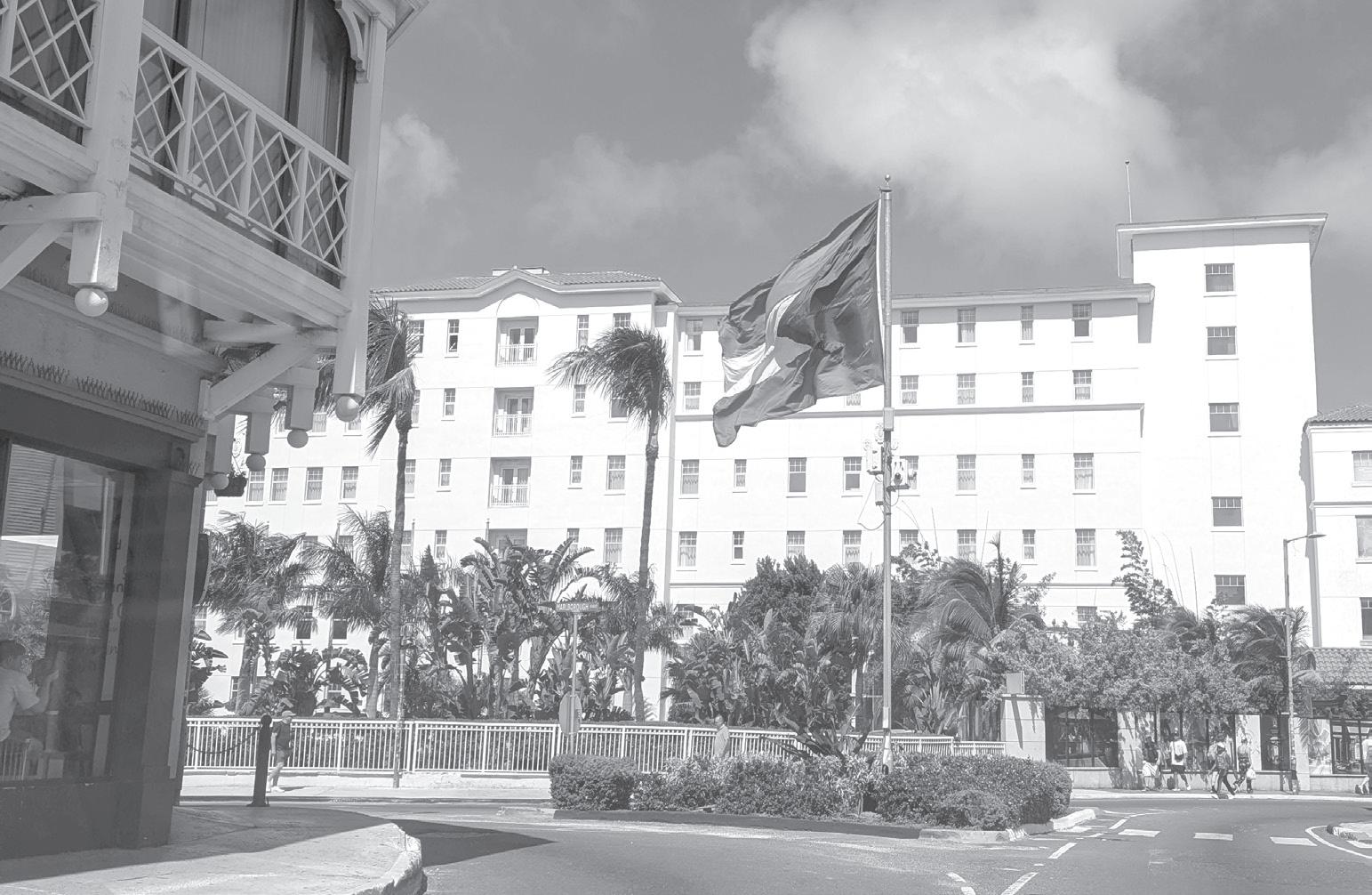

EDITOR, The Tribune.
FIRST of I would like to extend sincere condolences to the family of the late Vaughn Miller. Not only was he a well-known politician, Progressive Liberal Party Cabinet minister, radio personality and environmental activist, he was also a devout born-again Christian.
Miller was a very good Bible preacher and teacher. I recall him ministering in a Nazarene church over 16 to 17 years ago on the Old Testament Book of Nehemiah. His message was about rebuilding the walls. I can never forget that timely message. Miller’s death is simply a transition from earth to heaven. Saint Paul said in 2 Corinthians 5:8 that to be absent from this body is to be present with the Lord. I read in American evangelical writer Randy Alcorn’s book Heaven that this earth is the closest sinners will ever get to heaven while it is the closest believers will get to hell.
Now that Miller has been funeralised, all eyes are now on the November 24 byelection date. It is a given that the PLP candidate Senator Darron Pickstock is the perceived favorite to win the Golden Isles byelection, owing to his party holding the reins of power. The governing party has in its possession the resources of the state to pump into Golden Isles over the next several weeks, with the aim of wooing voters. In this
performance reviews. Table the nominee’s résumé, accomplishments, and any relevant findings in Parliament, then submit to a public hearing. Set measurable objectives for each Consul General, with annual reporting that the public can read and judge. This is normal in mature democracies. It should be normal here. This moment is an inflection point. We can continue to treat senior appointments as political favors, or we can insist on transparent, merit-based selections that rebuild trust. The choice will shape how partners view us, how investors assess risk, and how citizens measure the sincerity of every pledge to clean up governance. Bahamians are not asking for perfection. We are asking for standards. We are asking our leaders to match words with actions, and to show that integrity is not negotiable. Reverse this appointment or defend it in the open, with facts and metrics, not talking points. Either way, set a precedent that the public can respect. We deserve no less.
RYAN THOMPSON Nassau, October 26, 2025.
regard, the Free National Movement, in the event the opposition party chooses to run Brian Brown, is at a disadvantage. But I believe that the recent unrest with the Bahamas Union of Teachers and the Bahamas Public Service Union over a promised pay increase has somewhat leveled the playing field. This industrial unrest couldn’t have come at a more inopportune time. It is an indication that the PLP’s lengthy honeymoon period, spanning four years, has come at an end. This protracted grace period was brought on by the PTSD caused by the previous Minnis administration. Having said that, this upcoming by-election is giving me Marco City 1990 by-election vibes.
After FNM co-founder Sir Cecil Wallace-Whitfield died of cancer in 1990, the FNM fielded a young Grand Bahama based attorney named David Thompson to retain that Family Island seat for the opposition party. The PLP, under Sir Lynden O Pindling, fielded Albert Gray, who had worked at the Grand Bahama Port Authority. The FNM won. I believe that this was the first ever by-election victory for the FNM. The party went on
to win the general election two years later on August 19, 1992. Will we witness a similar scenario in Golden Isles, in the event the FNM runs?
While I am on the outside looking in, I believe that the opposition party should at least contest the by-election. To not do so would expose the party to allegations of cowardice. I don’t believe that it would be a good look not to contest this election while the upstart Coalition of Independents does so. That would be interpreted in some circles as the FNM abdicating its position as His Majesty’s Loyal Opposition. It would also be viewed as the party conceding defeat. Truth be told, this election will be a referendum on the governing party. The governing party continues to tout its success. A loss for the PLP would be greatly demoralising and an omen that greater trouble lies ahead at the polls. The FNM really has nothing to lose. Despite all of its challenges, a win would present the FNM as a legitimate alternative to the governing PLP. If Brian Brown is already working the grounds, then he should be allowed to run. Perhaps Brown will be able to accomplish what David Thompson did 35 years ago in Marco City.
KEVIN EVANS Freeport, Grand Bahama October 27, 2025.
EDITOR, The Tribune.
THIS morning, a newborn baby boy was found all alone in the bushes of our capital. He was still attached to his umbilical cord, fragile, and crying out for help. By God’s grace, a Good Samaritan familiar to me named Mr Gaitor heard the cry, followed the sound, and found the child. While trying to contact the authorities, Mr Gaitor prayed over the baby and declared life into the atmosphere. His kindness and courage helped save a precious infant. For that, we owe him our deepest gratitude. Today’s story brings to mind another baby from long ago. The Old Testament tells of Moses who was left among the reeds with God, and his sister, watching over him. Pharaoh’s daughter became the vessel through whom God’s plan was set in motion, simply because she was present, compassionate, and willing to act. In much the same way, I believe God has a purpose for this little boy and protected him as he lay there waiting to be discovered by Mr. Gaitor, who was attentive and ready to respond. God still places people in the right place at the right time to carry out His divine purpose.
As we thank God for this baby’s life, we must also
remember his mother. She is likely broken right now, physically, emotionally, and mentally. We do not know her story or her pain. What we do know is that she needs help, not hatred or condemnation.
Too often, our instinct as a society is to judge. Regrettably, when we rush to criticise, we make it harder for people, especially young or frightened mothers, to come forward and ask for help. We say we are a Christian nation. If that is true, then we must live out our faith by showing grace, not gossiping. Scripture reminds us to stop focusing on the speck in someone else’s eye when there is a plank in our own. So let’s all walk a day in another person’s shoes, carrying their burdens, instead of pointing fingers.
To any mother who feels overwhelmed, please know there are people who care.
The Bahamas Godparent Center is one such place. It offers counselling, support, and safe options for those who feel unprepared for parenthood. If you are in crisis, have the baby, and then get the baby to safety. There is always a better way.
As a country, we must do more to strengthen the systems that support our mothers before despair drives them to desperate choices. We need stronger
social services, more accessible counselling, and a foster care system that ensures every child has a loving home when parents cannot provide one. To the little boy whose cry was heard this morning, may your life be a testimony that it is not where we start, but where we finish. I look forward to the day when your story is told, not as a tragedy, but as a triumph. May you grow into a strong, kind, law-abiding citizen and a proud contributor to our great Commonwealth, as you live out God’s plan and purpose for your life. Today, a cry was heard. A baby was saved. And maybe, just maybe, God is reminding us that every life holds sacred purpose. That the true strength of a nation is not found in its GDP or global standing, but in how it responds to the quiet cries of its citizens and residents, from its infants to the elderly. The cries that echo from bushes, doorsteps, hospital rooms, and broken hearts. May we be the kind of people who hear those cries, and answer them with urgency.
SENATOR MAXINE SEYMOUR
Shadow Minister, Social Services, Information and Broadcasting October 27, 2025.
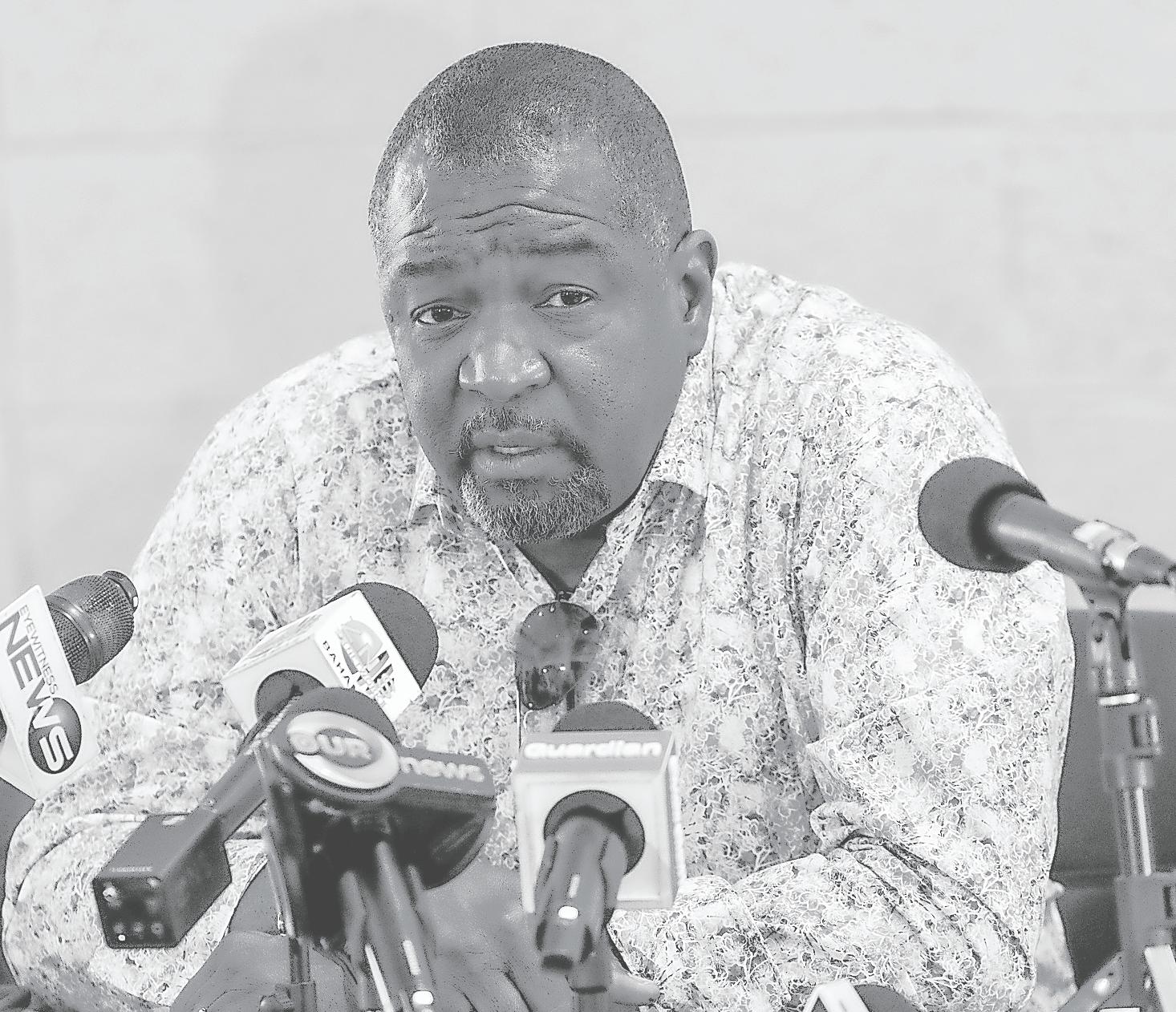
The fne, handed down by Magistrate Lennox Coleby, comes despite a 2021 Court of Appeal ruling that magistrates have no authority to impose non-custodial sentences for frearm-related offences.
A senior attorney, speaking to The Tribune on condition of anonymity, called the outcome “highly irregular and unlawful” but suggested it is likely to stand because it was agreed to by prosecutors as part of a plea deal.
Bahamians with far fewer weapons are routinely imprisoned regardless of the circumstances.
James Finkl, the 62-yearold former head of the US-based Finkl Steel, one of the world’s largest steel companies, was arrested after police searched his 126-foot pleasure craft, Odin, docked at Mega Marina Resorts World Bimini around 12.15pm on October 12.
Although Finkl initially told offcers he had only two guns in a safe, authorities found eight weapons inside, along with ammunition. A second cache of frearms was later discovered in a closet on the vessel.
In total, police recovered three .380 pistols, three .40 pistols, an AR-15 300 rife, an SR-556 rife, a Remington bolt-action rife, two .45 pistols, a 9mm pistol, a 5.7 pistol, and a 12-gauge shotgun. They also seized 206 .223 rounds, 205 .45 rounds, 197 5.7 rounds, 52 .40 rounds, 188 .300 rounds, 46 .380 rounds, 33 9mm rounds, 20 shotgun shells, seven .308 rounds, one .32-20 round, one
.50 round, one 1.50 round, one 1mm round, 13 5.56x45 magazines, seven .380 magazines, six 9mm magazines, fve .45 magazines, three .40 magazines, and one 5.7 magazine.
As part of a plea agreement, Finkl pleaded guilty to 27 frearm-related charges before Magistrate Lennox Coleby. These included four counts of possession of an unlicensed frearm with intent to supply, seven counts of possession of ammunition with intent to supply, two counts of possession of an unlicensed frearm, one count of possession of an unlicensed shotgun, seven counts of possession of ammunition, and six counts of possession of a component part of a frearm.
Defence attorney Parkco Deal said his client is a frequent visitor to The Bahamas and a frearm enthusiast who donates to charity and works as a stock trader. He said Finkl is now retired as the former owner of Finkl Steel.
Mr Deal told the court that Finkl suffers from several medical conditions, including severe memory loss and nerve disease, and has a metal plate at the back of his skull following an accident. He said his client receives stem cell treatments and wants to “set things right and move on.”
Finkl was ordered to pay a fne of $1,449,100 or face six years in prison. Upon payment, his vessel will be returned, and he has been advised to leave the country once the fne is settled.
Tavarrie Smith represented the accused, while Chief Superintendent Lakisia Moss appeared for the prosecution.
By KEILE CAMPBELL Tribune Staff Reporter kcampbell@tribunemedia.net
YOUTH, Sports and Culture Minister Mario Bowleg, who previously cited a Supreme Court ruling to justify cutting off funding to one Valley Boys faction, is now refusing to comment after the Court of Appeal swung the legal pendulum in the other direction.
Mr Bowleg told The Tribune on Sunday he had “no response” to the appellate decision and would “let the Court deal with it”.
The remark marked a sharp reversal from his stance in September, when he pointed to a March Supreme Court ruling that favoured the “Way Forward” faction led by Trevor Davis to defend the government’s decision to withhold seed funding from the long-established “World Famous” Valley Boys, headed by Brian Adderley.
The Court of Appeal last week criticised the Registrar General’s Offce over
the registration of Mr Davis’ group, describing the actions as “beyond belief”. The judges said unauthorised people had been allowed to register the group’s name and logo without proper verifcation under the Non-Proft Organisations Act. They granted Mr Adderley’s group leave to appeal, saying the case had “excellent prospects of success”.
A spokesperson for the World Famous Valley Boys said yesterday that they expect to now receive seed funding.
“We expect to receive seed funding every year, inclusive of last year and this year,” the Valley Communications Team said. “The Court of Appeal is supporting and cementing what we have been stating during the entire ordeal. We can only hope that the powers that be understand, take it into consideration and issue not only the funds for this year but also last year that we did not receive, totalling $70,000.”
The Way Forward group, meanwhile, has described the
appellate court’s comments as “unfortunate,” insisting its members were “founding, longstanding, and legitimate” Valley Boys members.
“The matter before the Supreme Court was addressed on the papers,” the group said. “We fnd the Court’s reliance on that characterisation most unfortunate; however, we remain fully committed to continuing our pursuit of justice through the pending judicial review action.”
The group said it remains focused on preparing for the upcoming Boxing Day and New Year’s Day parades, pledging to uphold “the spirit, excellence, and legacy of the Valley Boys—for the people, by the people.”
The Valley Boys leadership dispute erupted in 2023 after internal divisions split the group into two rival factions, one led by Mr Adderley, who has chaired since 2014, and another led by Mr Davis, who accused the former leadership of mismanagement and non-compliance with the NPO Act.
By PAVEL BAILEY Tribune Staff Reporter pbailey@tribunemedia.net
AN offcer testifed yesterday that a man shot and killed by police in Fox Hill in 2018 was a psychiatric patient at the Sandilands Rehabilitation Centre, as an inquest into his death began.
Superintendent Keino Demeritte gave evidence before Coroner Kara Turnquest Deveaux about his role as the investigator into the police-involved shooting of 43-year-old Jermaine Desmond Minnis, which occurred around 1.40pm on November 15, 2018.
Minnis was reportedly shot by Assistant Superintendent of Police Darrington Sands, the subject of the inquest, after he allegedly charged at him with a cutlass in the Fox Hill area.
Details of the incident were not released to the media until the following day. Police confrmed Minnis’s death only after a reporter inquired about his condition.
Superintendent Demeritte read the witness statement of Bradley Knowles, who said he saw the deceased, known to him as “Bookie”, swinging a cutlass at a vehicle in the area. Mr Knowles said two offcers approached calmly and tried to de-escalate the situation, but Minnis remained aggressive. He said he then heard three shots and told police that if the offcer had not fred, the assault would have continued.
Superintendent Demeritte also read from a Sandilands Rehabilitation Centre report dated December 11, 2018, which said that Minnis was a psychiatric patient who had visited the facility in 1988 and
again for one day on May 23, 2006.
However, he noted that no active fle for Minnis was found in Sandilands’ system.
Assistant Superintendent of Police Kellison Taylor, from the Police Armoury, testifed that offcers are trained to use deadly force only as a last resort and have the right to do so to preserve life.
He said a report classifed the incident as an assault with a deadly weapon.
When questioned by K Melvin Munroe, the offcer’s attorney, ASP Taylor said an offcer’s primary duty is to preserve life, even if that means prioritising it over the mental state of a threatening individual.
He added that the number of shots fred in such situations can vary depending on the threat.
Angelo Whitfeld marshalled the evidence.
By PAVEL BAILEY Tribune Staff Reporter pbailey@tribunemedia.net
A 30-YEAR-OLD mother was remanded to prison yesterday on a charge of child cruelty after a video showing her violently beating her daughter went viral on social media last weekend.
The woman, whose name is being withheld to protect the identity of the child, is accused of causing physical harm to her seven-year-old daughter
during a beating on October 24 in New Providence.
Videos posted to Facebook showed the woman attacking the child. In one clip, she throws her to the ground as the girl cries in pain. In another, she drags her by the hair, bangs her face into a door, and later stomps on her head.
Authorities said the child is now in the custody of the Department of Social Services.
The defendant appeared composed during her arraignment and pleaded not
guilty to a charge of cruelty to children before Senior Magistrate Kara Turnquest Deveaux.
Prosecutor Inspector Wilkinson objected to bail, arguing that the defendant was not a suitable candidate due to the violent nature of the alleged offence and the disturbing footage circulating online.
Bail was denied, and the woman was remanded to the Bahamas Department of Correctional Services until her trial, set for January 21, 2026.
By PAVEL BAILEY Tribune Staff Reporter pbailey@tribunemedia.net
TWO men were remanded to prison yesterday after being accused of fatally shooting a man near Early Bird Foodstore on Robinson Road earlier this month.
Prosecutors allege that Dieuson Tomas, 28, and Ravanno Lightbourne,
36, shot and killed Kenrick Pratt around 4.30pm on October 19.
After the shooting, Pratt reportedly crashed his car into another vehicle on Robinson Road near Third Street. Emergency medical services later arrived and found no signs of life.
The accused were not required to enter a plea to the murder charge when they appeared before Chief Magistrate Roberto Reckley.
Their case will proceed to the Supreme Court by way of a voluntary bill of indictment (VBI).
They were informed of their right to apply for bail through the higher court and will remain in custody at the Bahamas Department of Correctional Services until the VBIs are served on January 22, 2026.
Inspector Deon Barr prosecuted the matter.

THE fall of civilisations rarely begins with a loud bang; it starts with a shrug. It begins when people realise they can break small rules and get away with them, see that law enforcement is no longer enforced, and when the citizens become numb to disorder because “that’s just how things are now.” This slow erosion of the rule of law is not just a threat, it’s a ticking time bomb, the fastest way to destroy a nation. Chaos doesn’t take over a country overnight. It creeps in through the cracks, through indifference, complacency, and fear. It starts with the small things: the car without headlights driving at night, the motorcycle racing through traffc on one wheel, the vehicle towing six jet skis with no rear lights, the car parked on the sidewalk forcing mothers and children into the road. When no one does anything, when the police look the other way, and when society accepts this as usual, decay sets in.
The beginning of disorder
The rule of law is the backbone of any civilised society. It ensures safety, fairness, and accountability. When respected, citizens live in harmony; when ignored, the strong prey on the weak, and the reckless dominate the responsible. As citizens, we hold the power to maintain law and order by reporting violations, respecting traffc rules, and considering our neighbours’ peace. Our actions are not just a duty, they are a powerful tool in upholding the rule of law. However, it’s not just the citizens who bear this responsibility. Community leaders, including local government offcials, law enforcement agencies, and infuential fgures, play a crucial role in this shared responsibility. The frst signs of societal breakdown are never grand. They begin on the streets, the most public and visible spaces where laws are tested daily. When vehicles with no headlights or license plates roam freely, trailers are hitched without rear lights, and bus drivers speed and weave through traffc like renegades, it signals something more profound than poor driving habits. It signals that the social contract, the mutual agreement that we must obey specifc rules for the common good, is dissolving. This dissolution doesn’t just affect the general public; it disproportionately impacts the most vulnerable groups, such as children, older people,
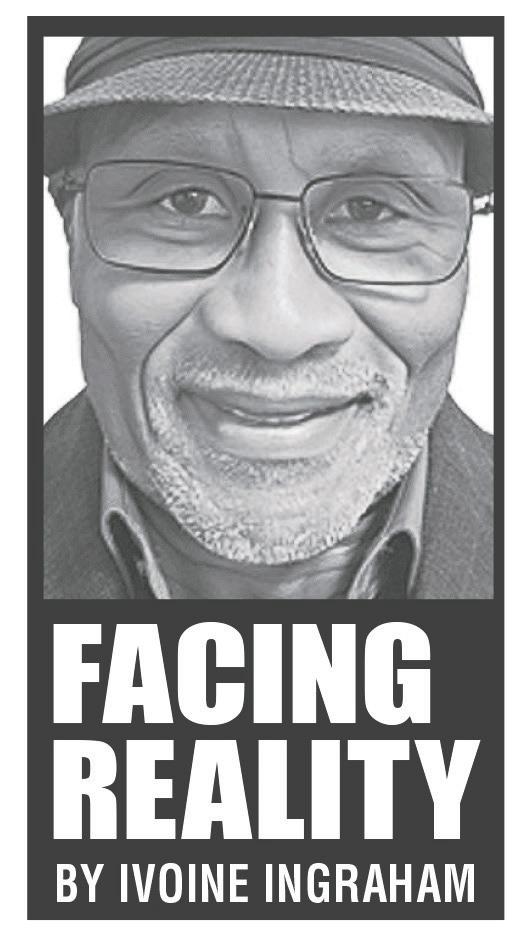
and people with disabilities, who rely on these rules for their safety and well-being. We must act to protect these vulnerable members of our society.
A car without headlights is not just a traffc violation but a declaration of indifference to others’ lives. A driver who tows six or eight jet skis without lights behind him is not merely careless; he is reckless, endangering everyone else on the road. When the authorities do nothing, and these acts become routine, the message to the public is clear: “You can do whatever you want. The law is optional.”
‘Complacency normalises chaos. Once, it was shocking to see a motorcyclist ride recklessly or a driver ignore a stop sign; now, it’s expected. Once, it was offensive to hear loud music blasting through the night; now, it’s a familiar soundtrack to sleepless neighbourhoods. Every act of tolerance toward disorder strengthens the hand of lawlessness.’
The collapse of enforcement When police offcers become spectators instead of protectors, the decline accelerates. Too many offcers have adopted a “nine-tofve” attitude toward their duty — visible during daylight, invisible when the real problems emerge at night. Many have become friends with offenders instead of defenders of the law. The uniform, once a symbol of order and authority, becomes a costume of complacency. When citizens witness police offcers turning a blind eye to dangerous stunts performed by motorcyclists, it’s not just a matter of traffc violations. It’s a sign of a society in crisis. Riders balancing on one wheel, speeding through intersections, and weaving between cars endanger lives, yet nothing is done. Drivers park across sidewalks, blocking pedestrians, and offcers pass by without warning. Vehicles are abandoned in front of private driveways, on hills, in front of fre hydrants, and near corners, yet no tickets are issued. The burden of removing derelict cars left on private property for months or years falls on the innocent
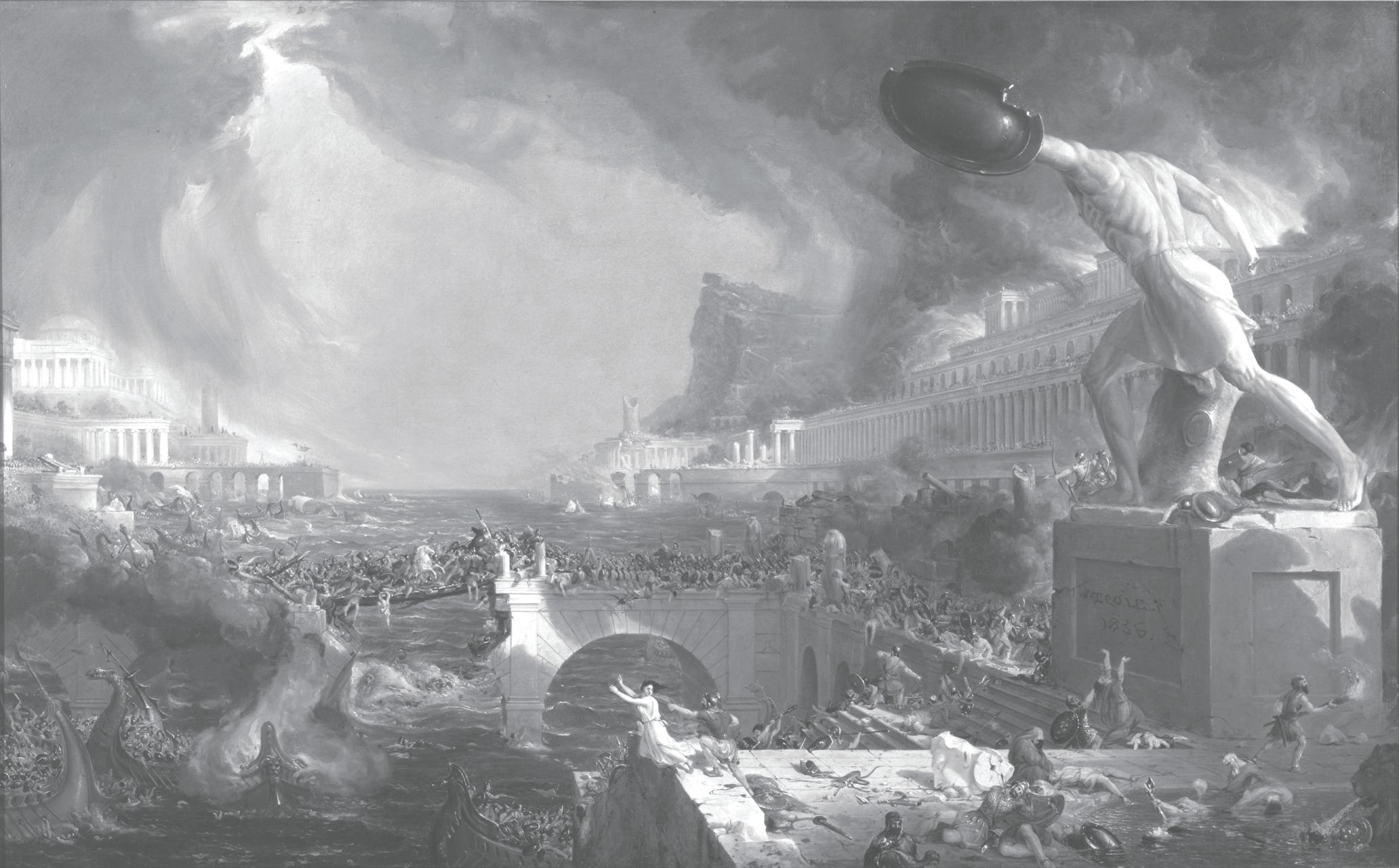
homeowner. This is not just a failure of law enforcement; it’s a collapse of the social order. It leads to a sense of lawlessness and a lack of safety in our communities. What kind of society allows this? A society that has forgotten what law and order mean. This practice was imported by those who see this as usual.
Police offcers are not supposed to be silent witnesses to disorder. Their job is not to make friends with those who fout the rules but to protect the innocent from those who endanger them. When the law enforcers grow indifferent, the entire system collapses. When citizens see that offcers will not act, they stop respecting them. We must maintain respect for law enforcement, as authority dies not with rebellion but with ridicule. People are relying on their relationship with connection to look the other way.
Complacency: The Quiet Killer of Order
The most dangerous force in any declining society is not crime but complacency. It is the shrug of the average citizen who says, “What’s the point? The police won’t do anything.” It is the sigh of the resident who no longer reports a violation because nothing has changed. It is the resignation of the pedestrian who walks around cars parked on the sidewalk because “that’s just how it is.” This complacency is the quiet killer of order, and we must resist it.
Complacency normalises chaos. Once, it was shocking to see a motorcyclist ride recklessly or a driver ignore a stop sign; now, it’s expected. Once, it was offensive to hear loud music blasting through the night; now, it’s a familiar soundtrack to sleepless neighbourhoods. Every act of tolerance toward disorder strengthens the hand of lawlessness.
When people realise that rules don’t matter, they break them too. This is how decay spreads, not through defance, but through imitation. Why
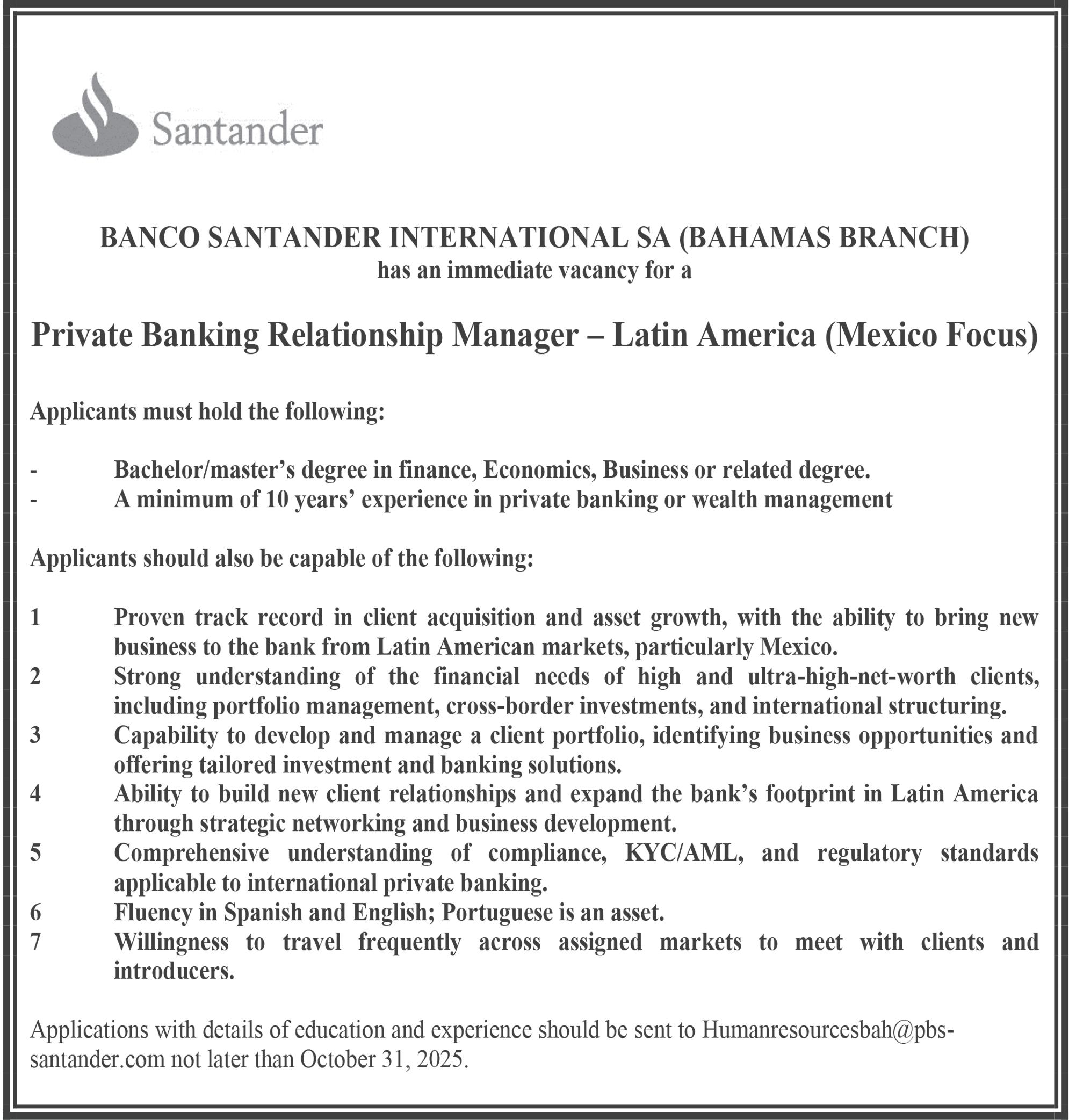
should one person stop at a stop sign if no one else does? Why obey parking laws when others get away with blocking driveways? Why pay attention to vehicle inspections or licensing if the streets are full of unregistered cars? Each act of tolerance toward disorder strengthens the hand of lawlessness. It’s up to each of us to break this cycle by upholding the rules, even when others don’t.
The disrespect of noise and the tyranny of the selfsh Noise pollution is another sign that a society has lost its sense of mutual respect. It is not just an inconvenience but an act of selfshness, an assertion that one person’s pleasure is more important than another’s peace. When someone throws a party that lasts until dawn, blaring music at unbearable levels, they are not celebrating; they are imposing.
What gives anyone the right to rob their neighbours of rest, peace, and the quiet comfort of their homes? Why should a child, an older adult, or someone ill endure sleepless nights because of another’s arrogance? A neighbourhood is a shared space, not a private stage. To disturb it with impunity is to declare war on civility. Police should treat such behaviour as the serious offence it is. Noise is not harmless — it affects health, causes stress, raises blood pressure, and destroys the sense of safety that people deserve in their homes. Yet, too often, when complaints are made, nothing is done. The music continues, the revellers laugh, and the law sleeps. This neglect sends a message identical to that on the roads: those who break the rules are rewarded with freedom, while those who respect them are punished with misery.
When the roads mirror the nation
Lawlessness on the roads is not just a traffc issue but a refection of a nation’s moral fabric. The driver disregarding a stop sign is no different from the offcial who abuses power or the citizen who evades taxes. All these actions undermine the rule of law and erode the foundation of a civilised society. If left unchecked, they can lead to a society where accountability is a rarity and chaos reigns supreme.
When drivers push their vehicles onto main roads, ignoring stop signs and forcing others to brake to avoid collisions, they violate traffc etiquette and the principle of fairness. The driver with the right of way must now yield to the bully or face damage and danger. This inversion of justice, where the wrong becomes the norm, mirrors what happens when entire institutions stop holding people accountable. When bad behaviour is rewarded with impunity, good behaviour disappears. Civility erodes. Fear replaces respect. And soon, the very idea of shared responsibility becomes extinct.
Dereliction and the burden of the innocent
In some neighbourhoods, derelict vehicles sit for years on private property, rotting
under the sun, attracting rodents and weeds, devaluing nearby homes. The owners of these properties are often powerless to act because the law makes it complicated to remove someone else’s junk.
Bureaucracy protects the violator instead of the victim.
How did we reach a point where those who respect the law suffer more than those who ignore it? How can the state, with all its power and machinery, fail to protect its most basic promise, that citizens will not be left to endure others’ neglect? These small injustices may seem trivial in isolation.
But together, they represent a moral collapse. A society that tolerates dereliction of private property, reckless driving, and public noise pollution no longer distinguishes right from wrong. It is a place where civility has died, and all that remains is survival.
When authority fears enforcement
There was a time when the presence of a police offcer inspired confdence. Now, it often inspires cynicism. Too many citizens have seen offcers stand by as rules are broken, sometimes because they fear confrontation, sometimes because they are too familiar with the offenders, and sometimes because they simply don’t care.
However, fear and friendship have no place in law enforcement. Authority that hesitates to act loses its legitimacy. And once authority loses legitimacy, chaos flls the vacuum.
Bus drivers who speed, cut corners, and intimidate smaller vehicles are dangerous and symbolic. They represent a society where brute force replaces fairness, where might replaces right. When the police condone or ignore such callousness, they are not just neglecting their duty; they are encouraging tyranny on the roads.
The cost of indifference
The cost of this nationwide apathy cannot be measured merely in accidents or sleepless nights. It is calculated in the slow decay of trust in authority, institutions, and one another. When the law is not enforced, people stop believing in it. When the police fail to protect the innocent, the innocent stop respecting them. When chaos becomes normal, order becomes exceptional. No country can survive long under such conditions. When laws become jokes, authority becomes invisible, justice becomes selective, and neighbours become enemies, collapse is inevitable. History has shown it repeatedly: societies that ignore minor transgressions invite great disasters.
The path back to order
Restoring order begins with reestablishing respect, not through fear but fairness. The rule of law must return as an equal force, applying to everyone without exception. The streets must no longer be theatres of recklessness, but symbols of civility.
Police offcers must rediscover their purpose. Their
duty is not to coexist with offenders but to protect citizens from them. Enforcement must be visible, consistent, and just. A single act of accountability can restore more faith than a hundred speeches.
But citizens, too, must shoulder responsibility. Civic order cannot exist if people treat laws as optional. Every driver who obeys a stop sign, every homeowner who respects their neighbour’s peace, every citizen who refuses to tolerate disorder contributes to national recovery. Law is not just written in books; it is lived through daily behaviour.
The moral imperative Respect for the rule of law is not merely a legal obligation but a moral one. It is the foundation of equality. When people follow rules, even when no one is watching, they affrm their commitment to one another. They acknowledge that their freedom ends where another’s begins. That is the essence of civilisation. Noise, reckless driving, and disregard for property are not random acts; they are symptoms of a deeper disease: selfshness. Selfshness, left unchecked, becomes cruelty. When one person’s pleasure creates another’s suffering, when one person’s convenience becomes another’s danger, when one person’s music becomes another’s torment — that is not freedom. That is moral anarchy.
Conclusion: The line between freedom and chaos
The difference between a civilised nation and a chaotic one is simple: in a civilised nation, people restrain themselves out of respect for others; in a chaotic one, people do whatever they want because they can. When cars without lights roam the night, when motorcycles perform stunts beside police patrols, when parties blare until dawn, when derelict vehicles rot on private lands, and when law enforcement does nothing, that nation is in crisis. It is not just a traffc problem or a noise problem; it is a moral problem. If small acts of lawlessness persist, we invite greater corruption and violence. The road to tyranny is paved not by bold revolutionaries, but by indifferent citizens.
Faced with reality, a nation cannot survive without law, and law cannot survive without respect. Order is not the enemy of freedom — it is its guardian. To preserve it, we must all remember that civilisation depends not on what we are allowed to do but on what we choose not to do.
People from faraway lands impose their customs on us, and we slowly conform so much that we cannot recognise who we are anymore. We adopt their music and practices and even try to talk like them. We have abandoned what was Bahamian and cannot utter Bahamianisation ever again because it is only a fgment of our imagination. Soon, peas and rice will be a thing of the past.
By ROCHELLE DEAN
POLITICS in the Bahamas has easily become entertaining at minimum as leaders use their platforms to mame each other right before the eyes of the Bahamian electorate.
These same leaders exercise unscrupulous acts of dissent and divide while making false promises and demanding respect.
The standard for leaders seems to contradict the very purpose of their offce.
The engagement with each other and the public is governed by a colonial ideology of leadership and it is very disturbing to watch as the country evolves with little to no behavioural change in leadership.
The tit-for-tat that never translates into meaningful opposition of the current administration or government policies is laughable and laudable all at the same time.
The fact that we have leaders who prefer public discourse and a political row over decisive relevant opposition is profoundly pedestrian.
This however, isn’t a general condemnation as the reliance on those leaders who do bring a level of competency and political acumen are obviously lauded by the public and politically astute.
The distraction of petty politics is as dangerous as it is disappointing for the entire Bahamian electorate.
Along a similar vein, members of the public are also engaged in these political

games we coined polititricks. However, the general public are arrested and brought before the courts for these same theatrics in many cases led by political leaders who encourage this behaviour in exchange for political favors and cronyism. The Bahamian public obviously easily play these games in desperation for political astuteness, favor and notoriety.
The consequences however present a different reality as these persons become weaponised to fuel petty political reasoning.
These tactics do nothing to quell the political diaspora and the discourse that exists within the political arena.
Matter-of-factly it propels the common ideology that everything in the Bahamas derives from politics and as
true as that may be it certainly is of no consequence or of any good to those Bahamians who simply view the electoral process as bureaucratic and far less democratic in nature.
This double standard demands participation by all Bahamian’s at any cost and most fttingly for the cause and proliferation of a distracted electorate who in most cases suffer greatly at the hands of the elected few.
Political populism seems to be on the decline for a perceived elite dynamic. This reality isn’t new but it means that democratic principles and the rule of the people is rather, heavily diluted for a perceived elite dynamic. Those that should be
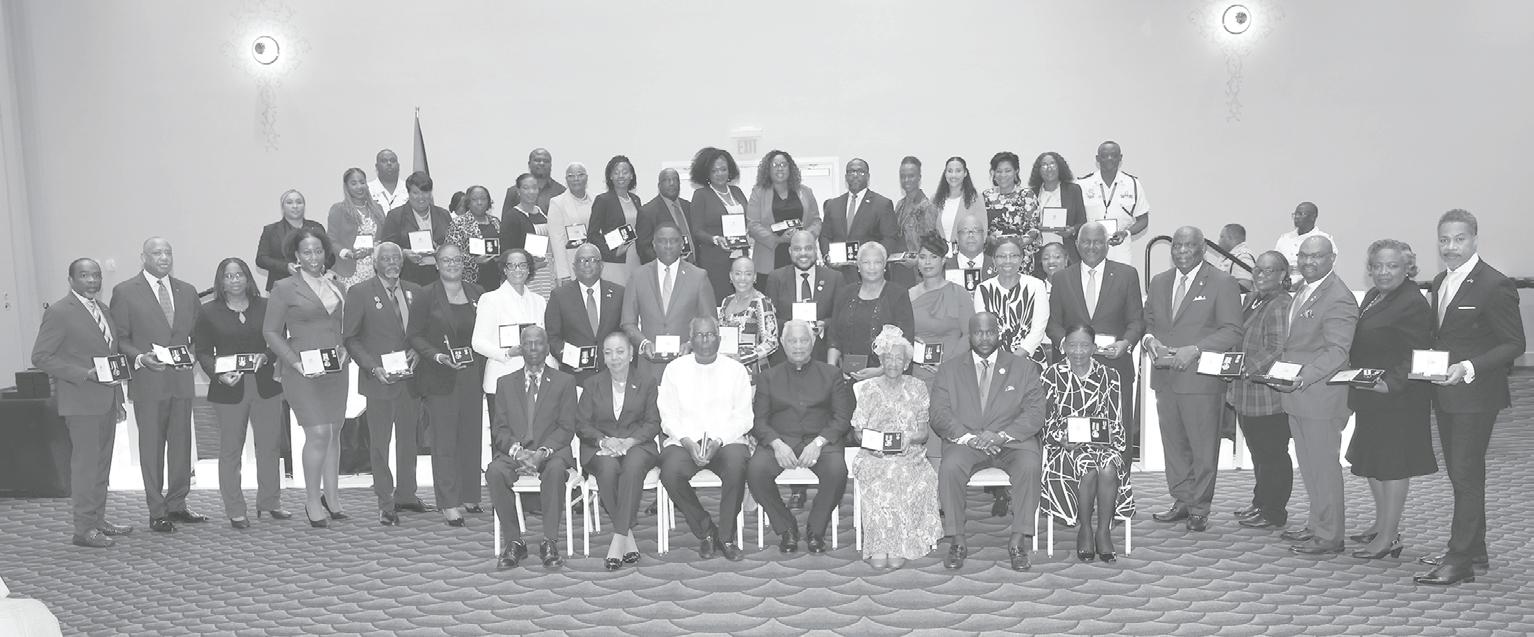
FORMER Prime Minister Perry Christie and Minister of Foreign Affairs Fred Mitchell thanked members of The Bahamas’ Foreign Service for their contributions during an award ceremony at Baha Mar Resort on October 23.
The ceremony, a presentation of Foreign Service Medals, recognised serving employees and distinguished citizens.
Mr Christie said no one could ever over emphasise the work of diplomats, adding: “You have the privilege of representing The Commonwealth of The Bahamas whether here in the offce of the foreign ministry or abroad in the service of international affairs.” He said: “The issues that affect our nation are issues of its survivability.” During the ceremony, 115 past and present foreign service members were honoured in several categories
including: the Lynden Pindling Medal For Leadership, the Distinguished Foreign Service Offcer Medal, the Paul Adderley Medal For Excellence, the Clement Maynard Medal For Innovation, the Janet Bostwick Medal For Women In The Foreign Service, the Foreign Service Bravery Medal and the Fred Mitchell Medal For Statesmanship.
Photos: Patrick Hanna/BIS
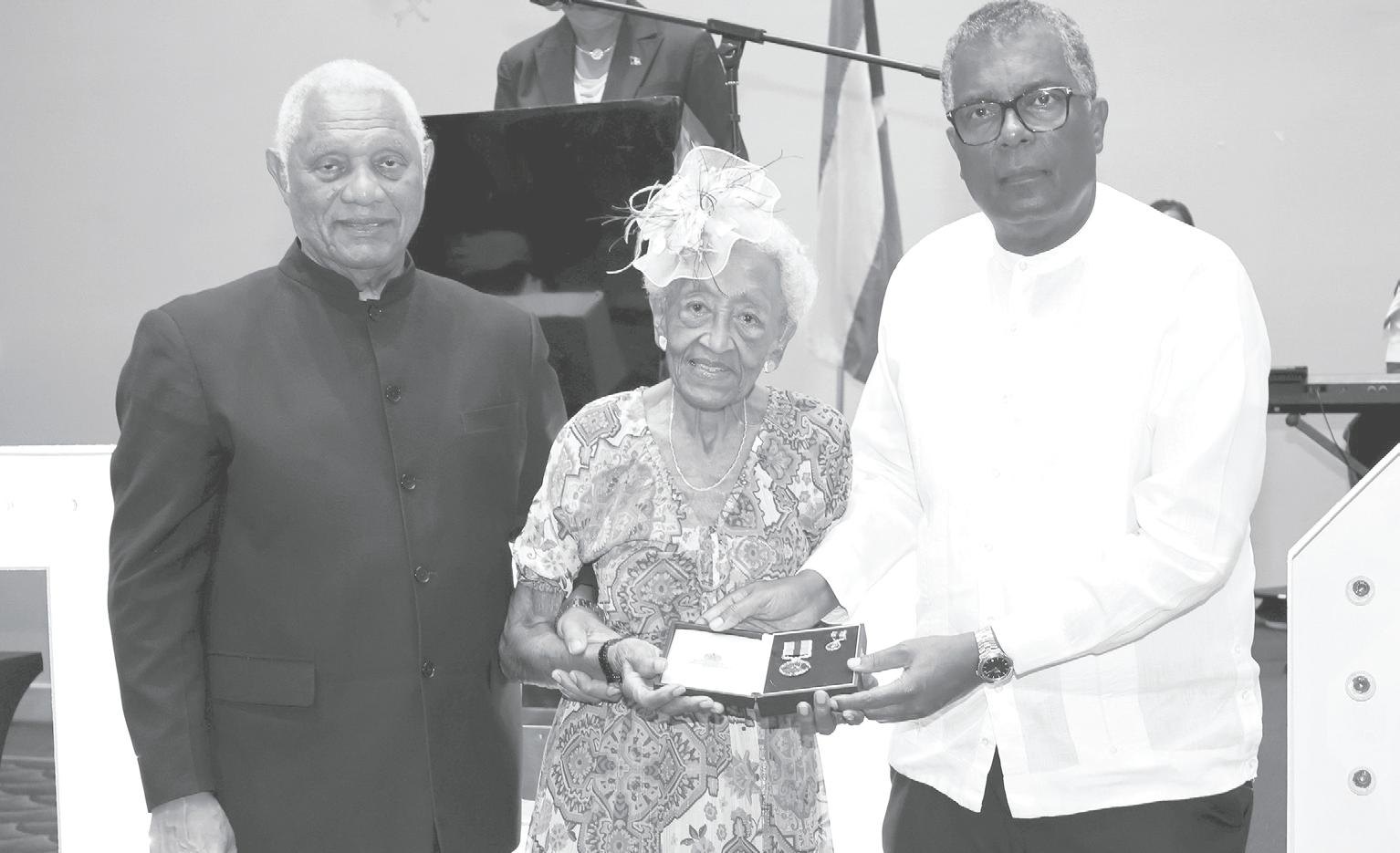
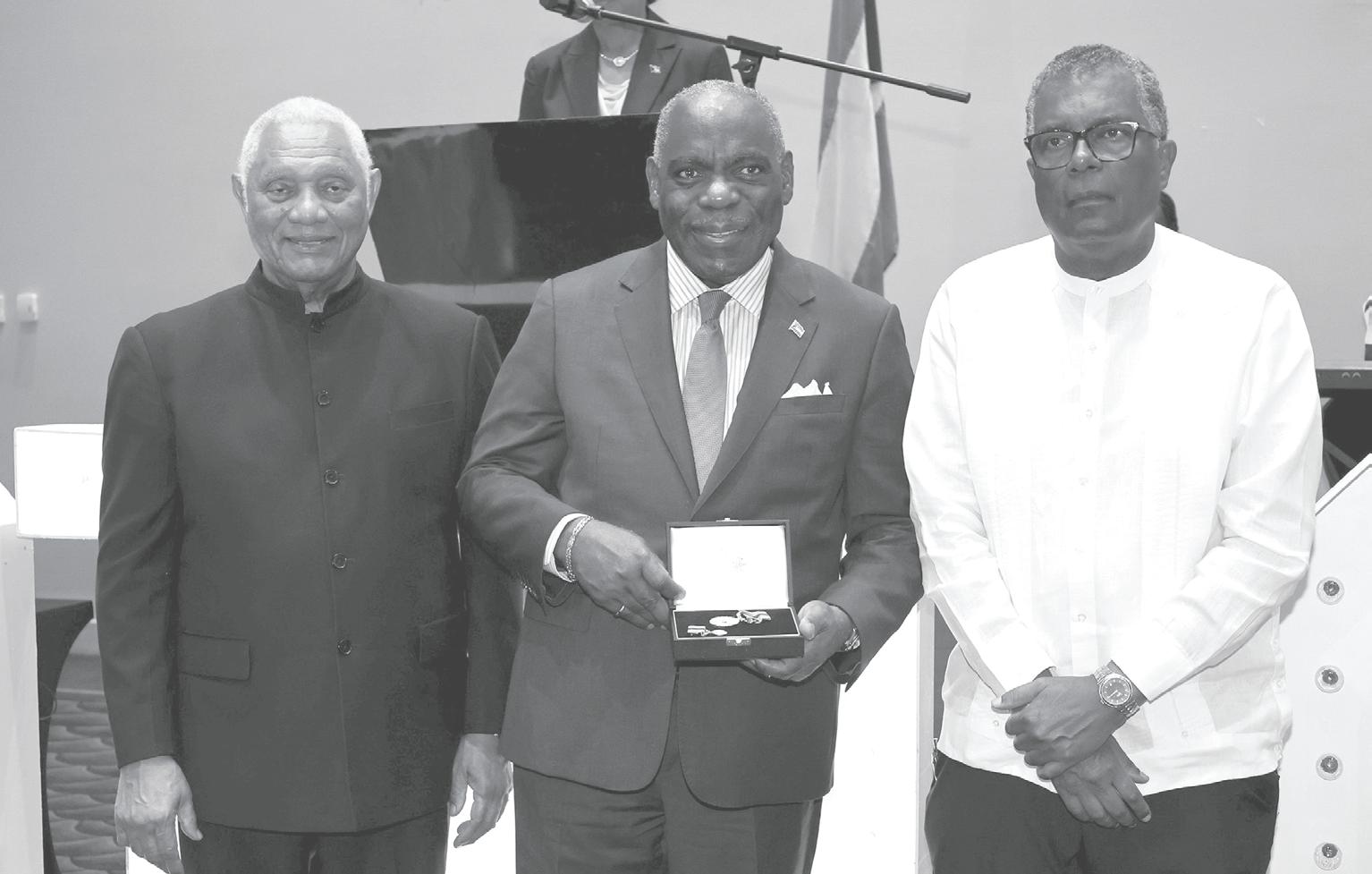
advocates for democratic principles are now exploiting and prostituting politics for their own individual gratification.
This is where we see citizenships being renounced, newly regulated and once illegal industry’s being abandoned, double minded political players continually undecided about leadership and aspiring political hopefuls refusing to follow proper protocol.
On the fip side of the coin, we see the passing away of a collective form of fascism that had brought about a stalemate regimentation of no progress.
This is a hallelujah moment for most who are witnesses to so many emerging systems of entry into the political arena.
These civic emergences can be perceived as wonderful and even progressive, making opposition the strongest show of democracy and must not be viewed from the lens of negativity resulting in resistance and expulsion.
However, there must be ‘caution’ as this can also lead to “machiavellian dynasties” that can be likened to countries like Columbia and even Haiti.
Amoral popular appeasement cannot be at the helm of political rule and national sovereignty.
Leaders must be rooted in trustworthiness, honesty, integrity and love for the Bahamian people.
Leaders must be knowledgeable about the challenges the people face but more so familiar with proper methods to make concise contributions
to the advancement of constituents and the country.
Leaders should be visionaries not simply signatories to agreement, conventions and investments.
There must be evidence-based results and outcomes rooted in negotiations that put Bahamian’s frst.
The Bahamian people deserve more than well spoken speeches about their many woes in the honorable house of assembly.
The people deserve solutions and if not that, they deserve transparency.
The reality is that politics is becoming an advancement of a few at the expense of the masses. And while, to be able to serve is truly a dichotomy, something has to give as Bahamian’s have affectionately coined Bahamian politics silly season.
This leads us to the crux of the matter - a political plethora of candidates, committees and aspiring leaders that may be needed or wanted but leads to confusion and lack of clarity.
If one takes a look at the social architecture of the Bahamas it is easy to see that the country went from no progress to a plethora of policies, new regulatory changes, competing ideas and proposals as well as political hopefuls.
Certainly, this does speak to the strength of the country’s democracy or perhaps the
lunacy of its societal make up.
The country is rich in leadership yet, there exists a dearth in areas that need the same zeal.
The gap between knowledge, resources and decision making seems to be lacking.
While the realities of political plethora look very democratic and politically pleasing to the masses but in actuality it leads back to the same circular rationale.
Voter fatigue and confusion then becomes a serious challenge, leading the country to coalition governments, cancel culture and fnally, back to two-party dynamics and overall political gridlock.
Finally, these observations obviously highlight that every effort to build a robust Bahamian community leads to politics while other spaces shrink.
Community building becomes another task that leads to apathy and fuels the stop, review and cancel effect that has become very familiar to the Bahamian people.
The political plethora has become a great hindrance to nation building as productivity, respect, value and true nationalism is quantifed through the lens of political affuence.
This reality isn’t a bad thing but there must be a sense of balancing collective contributions with one’s individualistic identity, while also recognising that contribution to one’s country is not only a right but an obligation and politics requires greater metrics of access and acumen for entry into public service.

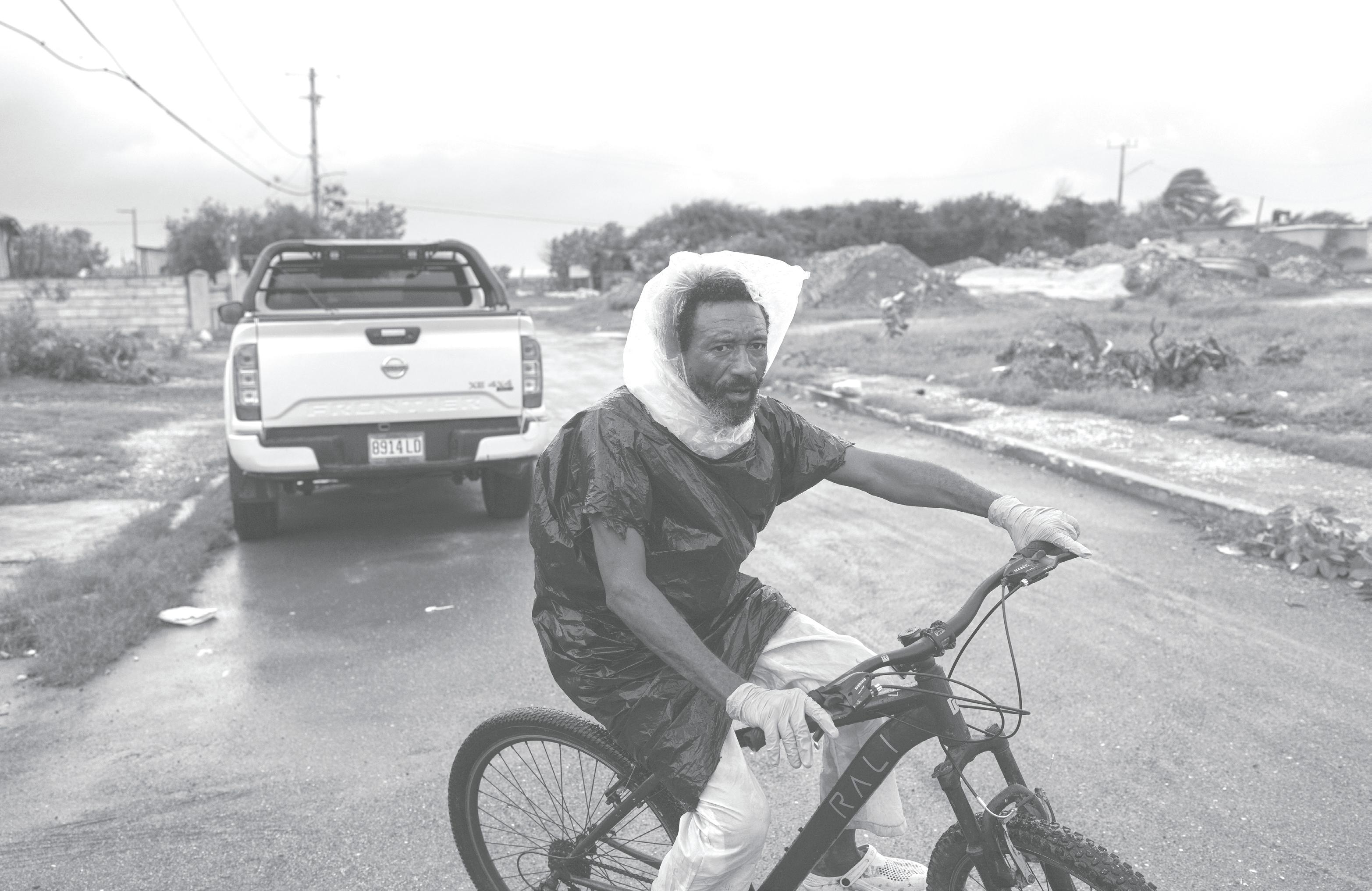
By JOHN MYERS JR. and DÁNICA COTO Associated Press
HURRICANE Melissa intensifed into a Category 5 storm on Monday as it drew closer to Jamaica, where forecasters expected it to unleash catastrophic fooding, landslides and widespread damage. At that strength, it would be the strongest hurricane to hit the island since record-keeping began in 1851.
Blamed for six deaths in the northern Caribbean as it headed toward the island, Melissa was on track to make landfall on Tuesday in Jamaica before coming ashore in Cuba later in the day and then heading toward The Bahamas. It was not expected to affect the United States.
Anticipating the hardship in store for his country, Jamaican Prime Minister Andrew Holness said: “I have been on my knees in prayer.”
Hanna Mcleod, a 23-yearold hotel receptionist in the Jamaican capital of Kingston, said she boarded up the windows at her home, where her husband and brother are staying. She stocked up on canned corned beef and mackerel and left candles and fashlights
throughout the house. “I just told them to keep the door closed,” she said. “I am defnitely worried. This is actually the frst time I’ll be experiencing this type of hurricane.” Category 5 is the top of the Saffr-Simpson hurricane scale, with sustained winds exceeding 157 mph. Melissa would be the strongest hurricane in recorded history to hit the small Caribbean nation directly, said Jonathan Porter, chief meteorologist at AccuWeather.
A storm surge of up to 13 feet was expected along coastal Kingston, which Porter said is home to critical infrastructure such as Jamaica’s main international airport and power plants.
“This can become a true humanitarian crisis very quickly, and there is likely going to be the need for a lot of international support,” Porter said in a phone interview.
On Monday afternoon, Melissa was centred about 140 miles southwest of Kingston and about 320 miles southwest of Guantánamo, Cuba. The system had maximum sustained winds of 175mph and was moving northwest at 3mph, according
to the US National Hurricane Center in Miami.
Parts of eastern Jamaica could see up to 30 inches of rain while western Haiti could get 16 inches, the hurricane center said, citing the likelihood of “catastrophic fash fooding and numerous landslides”.
Mandatory evacuations were ordered in food-prone communities in Jamaica, with buses ferrying people to safe shelter.
But some insisted on staying.
“I hear what they say, but I am not leaving,” said Noel Francis, a 64-year-old fsherman who lives on the beach in the southern town of Old Harbor Bay, where he was born and grew up. “I can manage myself.”
His neighbour, Bruce Dawkins, said he also had no plans to leave his home.
“I am not going anywhere,” Dawkins said, wearing a raincoat and holding a beer. The fsherman said he had already secured his vessel and planned to ride out the storm with his friend.
Several towns along Jamaica’s southern coast already reported power outages as winds picked up throughout the night.
“My only concern is fooding, because we live near the sea,” said Hyacinth White, 49, who said she had no plans to evacuate to a shelter.
Offcials said the biggest storm surge was expected in the Black River community in western Jamaica, where Sandra Walker was the sole street vendor working just hours ahead of the hurricane.
“I have no choice but to be here,” she said as she sorted potatoes, green bananas, tomatoes and scallion stalks in her stall.
Walker, a single mother of two, is still struggling to recover after Hurricane Beryl destroyed her business and home last year. She lives by the ocean but does not plan to go to a shelter because she had a “terrible” shelter experience during Hurricane Ivan, when the facility offered only a handful of tins of corned beef to share.
Jamaican government offcials said they were worried that fewer than 1,000 people were in the more than 880 shelters open across the island.
“It’s way, way below what is required for a Category 5 hurricane,” said Daryl Vaz, Jamaica’s transport minister, who urged people “to be

smart ... If you are not, unfortunately, you will pay the consequences.”
The slow-moving storm has killed at least three people in Haiti and a fourth person in the Dominican Republic, where another person remains missing. Two people died in Jamaica over the weekend as they cut trees ahead of the storm.
“It’s nothing to play with,” said Water and Environment Minister Matthew Samuda.
“The time for preparation is all but over.”
More than 50,000 customers were without power.
Landslides, fallen trees and downed power lines were reported ahead of the storm.
In eastern Cuba, a hurricane warning was in effect for the Granma, Santiago de Cuba, Guantánamo and Holguin provinces, while a tropical storm warning was in effect for Las Tunas. Up to 20 inches of rain was forecast for parts of Cuba, along with a signifcant storm surge along the coast.
Cuban offcials said they would evacuate more than 600,000 people from the region, including Santiago, the island’s second-largest city. Long bus lines formed in some areas.
Evan Thompson, principal director at Jamaica’s meteorological service, warned that cleanup and damage assessment would be severely delayed because of anticipated landslides, fooding and blocked roads. A storm of Category 4 or higher has not made landfall in Jamaica in 174 years of record-keeping. Hurricane Gilbert was a Category 3 storm when it hit the island in 1988. Hurricanes Ivan and Beryl were both Category 4, but they did not make landfall, Thompson said. The storm already has drenched the Dominican Republic, where schools and government offces were ordered to remain closed on Monday in four of nine provinces still under the most serious form of weather alert. Melissa damaged more than 750 homes across the country and displaced more than 3,760 people. Floodwaters also have cut access to at least 48 communities, offcials said. In neighbouring Haiti, the storm destroyed crops in three regions, including 15 hectares of maize at a time when at least 5.7 million people, more than half of the country’s population, are experiencing crisis levels of hunger.

By ALLANDRA RUSSELL
IN COUNTLESS homes
each night, around kitchen tables, on living room foors, or in quiet corners, learning can feel like a battlefeld.
Voices rise, tempers fare, and what starts as reinforcement often ends in frustration. It’s no mystery why; students already weary from a six-hour school day are then subjected to one or two more hours of academic overtime.
Homework was created to reinforce learning beyond the classroom and to build responsibility, time management, and independence.
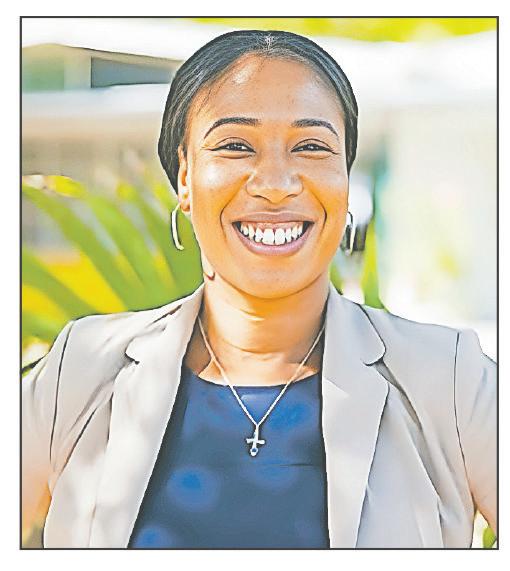
We’ve debated it, researched it, even complained about it, but somehow, homework remains one of education’s most unshakable habits. It’s time not just to ask, but to act on whether homework has become a redundant ritual or a meaningful tool that actually correlates with student success. If it’s no longer structured to inspire growth and curiosity, then perhaps it’s time to rethink its place in education.
The homework burden Despite decades of research questioning its value, the homework ritual persists. Harris Cooper’s meta-analysis found that homework is correlated with increased achievement for secondary students. For younger students in grades K–6, the beneft is much smaller. Even among older students, outcomes depend on the amount and type of homework, as well as the student’s home environment.
A Stanford University study echoed this, revealing that excessive homework leads to anxiety, sleep deprivation, and physical health problems. Students reported feeling constantly tired, overwhelmed, and disconnected from their family life. For many, the day doesn’t end when the bell rings; it simply changes location. Parents, already stretched thin, step into the roles of tutors and sometimes, unwilling combatants. Evenings transition into a cycle of survival, a rhythm of work, traffc, dinner, homework, chores, prep, and repeat. What was meant to build discipline now simply drains the little time families have left to connect.
I’ve seen the toll frsthand. The pressure rises when students come home with assignments they haven’t yet grasped, shifting the role of parents from supporters to substitute teachers. Dinner tables turn into classrooms; tears replace laughter. The intent was learning. The outcome is stress.
Homework’s silent bias
Homework doesn’t impact all children equally. For students from homes with access, support, and quiet study spaces, it reinforces learning. But for others, those without Wi-Fi, parental help, or even stable electricity, it becomes an uneven struggle.
The OECD’s global studies show that homework often widens achievement gaps. A child with a parent who can guide them through a science project thrives; a child who must fgure it out alone falls behind. I’ve watched students proudly display projects clearly crafted with adult precision, while others whisper, I had no help. When grades are tied to those disparities, homework becomes less about learning and more about privilege.
Even more troubling is the question teachers quietly ask themselves: Did the child actually do the work? When a student consistently struggles in class but returns perfect

ISLAND Orienteering, a new Bahamian outdoor sporting adventure, has launched.
In partnership with Puressence Company Limited, Island Orienteering aims to provide fresh-air adventures. While Puressence promotes clean air indoors, Island Orienteering celebrates it outdoors—uniting both organisations under the shared theme of healthy living through clean air experiences.
Orienteering is a sport that challenges participants to navigate through unfamiliar terrain using only a printed map and a compass to locate hidden checkpoints. Popular in the UK, Canada, and the USA, the sport encourages teamwork, critical thinking, and physical ftness— all while fostering a love for nature and exploration.
The club’s activities will target school groups, birthday parties for big kids, seasonal public events and tours, with locations changing regularly to keep each
adventure fresh and exciting.
Island Orienteering debuted with the “Un-Haunt Hunt” on October 24 in downtown Nassau. This anti-Halloween event challenged participants to explore places rarely frequented—using “haunt” in its Bahamian sense, meaning to “frequent”.
The Latitude Attitude Dudes—a team of young orienteers — led by students from primary and junior high schools across New Providence rated the event a 5-star. They were chaperoned by “ghost” adults, they navigated four historical and cultural sites without map-reading help.
While the exact event locations remain a closely guarded secret, all participants agreed that for this event, “Ole Nassau comes to life.” The course was described as a mix of history and culture—an outdoor lesson that’s hands-on, thrilling, and fun.
The Bahamas’ debut junior
orienteering event highlighted teamwork, skill, and expert map-reading. Team leaders Abijith Nair, Caerwyn Turnquest, and Kymani Poitier guided their groups through challenging checkpoints, with participants Marlee Poitier, Gerard Pinder, and Zakharie Minus, showing exceptional focus. The Geographer title went to 6th grader Caerwyn Turnquest of Kings College School, who identifed over 190 countries on a blank map and won the Country Bee challenge, 9th grader Abijith Nair of Queens College placed second, and 9th grader Gerard Pinder of Pace Academy took third.
Voted as the ultimate guide, Abijith Nair earned the “Who You’d Want Lost in the Woods With” award.
“Orienteering isn’t just a sport,” said club representative Christanell Gordon. “It’s an adventure in the real world that builds confdence, sharpens the mind, and encourages young people to see their surroundings with new eyes.”
assignments, we must confront the uncomfortable truth: Are we grading effort, or just the illusion of it?
Quality over quantity
The value of homework has never been about volume; it’s about purpose. Piling on tasks for the sake of rigor doesn’t build mastery; it builds resentment and slowly makes students hate school. In several high-performing education systems around the world, students spend less time on homework yet continue to outperform global averages. The difference lies not in the quantity of work assigned, but in the quality of instruction and the balance between learning and well-being.
Education should not feel like a never-ending marathon. Between studying, assignments, extracurricular activities, and the simple need to be a child, balance must return to the learning experience. A child’s mental health and sense of curiosity are just as vital as academic scores. If we are educating the whole child, we must treat rest, play, and family connection as integral parts of learning, not interruptions to it.
A call to reimagine If homework must exist, let it serve a higher purpose. It doesn’t need to happen every day, nor should it mirror classroom drills. Let it extend curiosity instead of weariness. Use it as a bridge between school and the world, a way to foster critical thinking, creativity, and communication. Homework should push students to think beyond the page, to question, build, and create. Let’s design assignments that ask them to explore issues that matter to their communities and their country, to imagine solutions, to speak, write, and act with purpose. Because the goal isn’t to remember the facts; it’s to understand the world they’re meant to change. When learning extends beyond the worksheet and into purpose, then education has truly done its work.
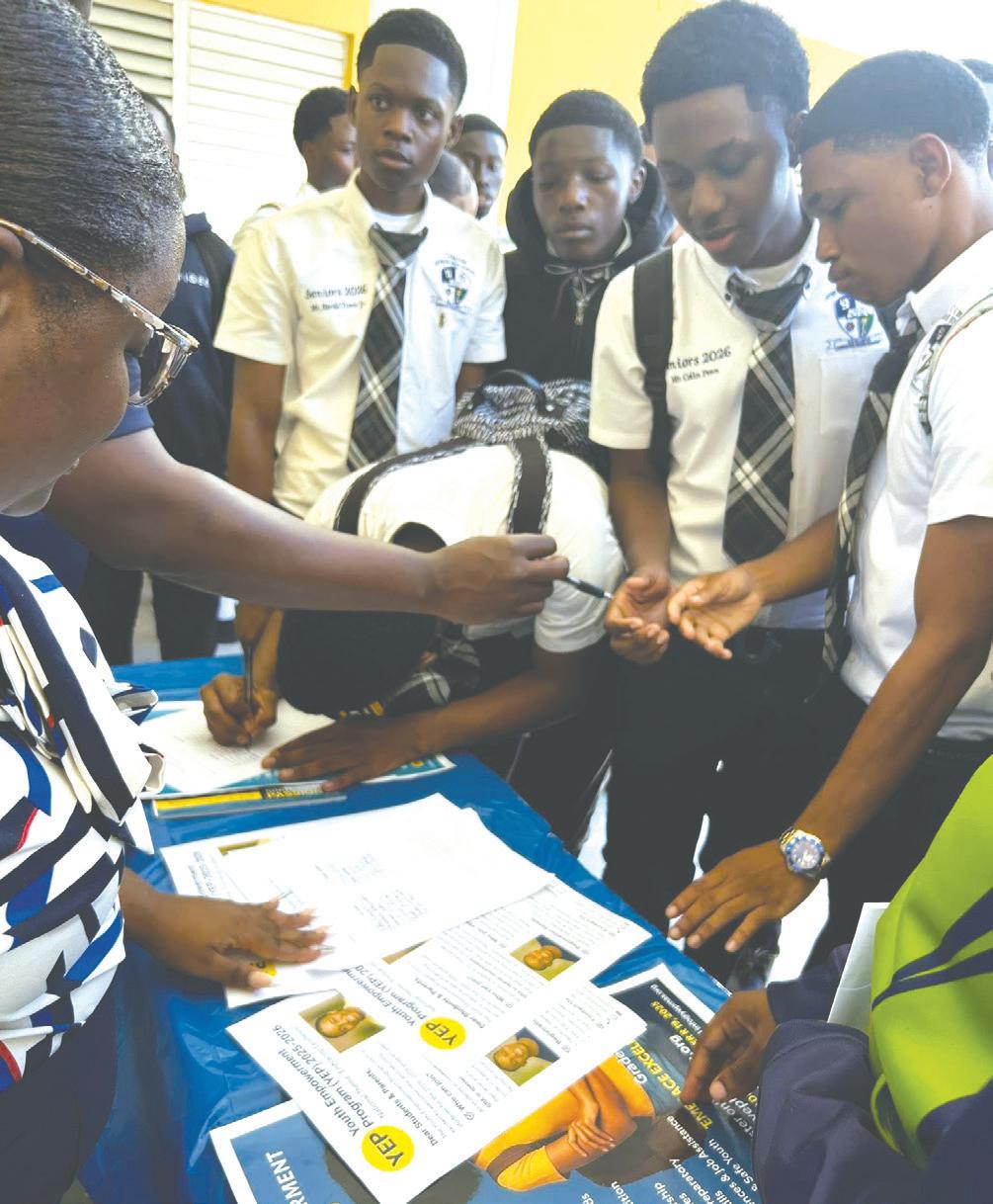
THE Youth Empowerment Programme (YEP) has started its 2025-2026 year with record-breaking participation and a fnancial commitment from Consolidated Water (Bahamas) Ltd (CWCO).
More than 500 students from public and private schools across New Providence have joined the programme, marking one of YEP’s largest and most energetic openings yet. The organisation’s district meetings kicked off this month.
CWCO’s donation will help YEP continue expanding its leadership and mentorship activities while providing the resources needed to engage more young people across the islands.
General manager of CWCO Henderson Cash said: “Just as water sustains life, opportunity sustains growth. YEP is doing incredible work to shape future leaders of The Bahamas. CWCO is proud to support a programme that gives young people the guidance and encouragement they need to thrive.”
Executive director of YEP Delano Munroe said: “This is one of the most exciting years we have ever had. Support from community partners like CWCO helps us keep that momentum going. Every donation allows us to empower more students to lead, serve, and make a difference in their schools and communities.”

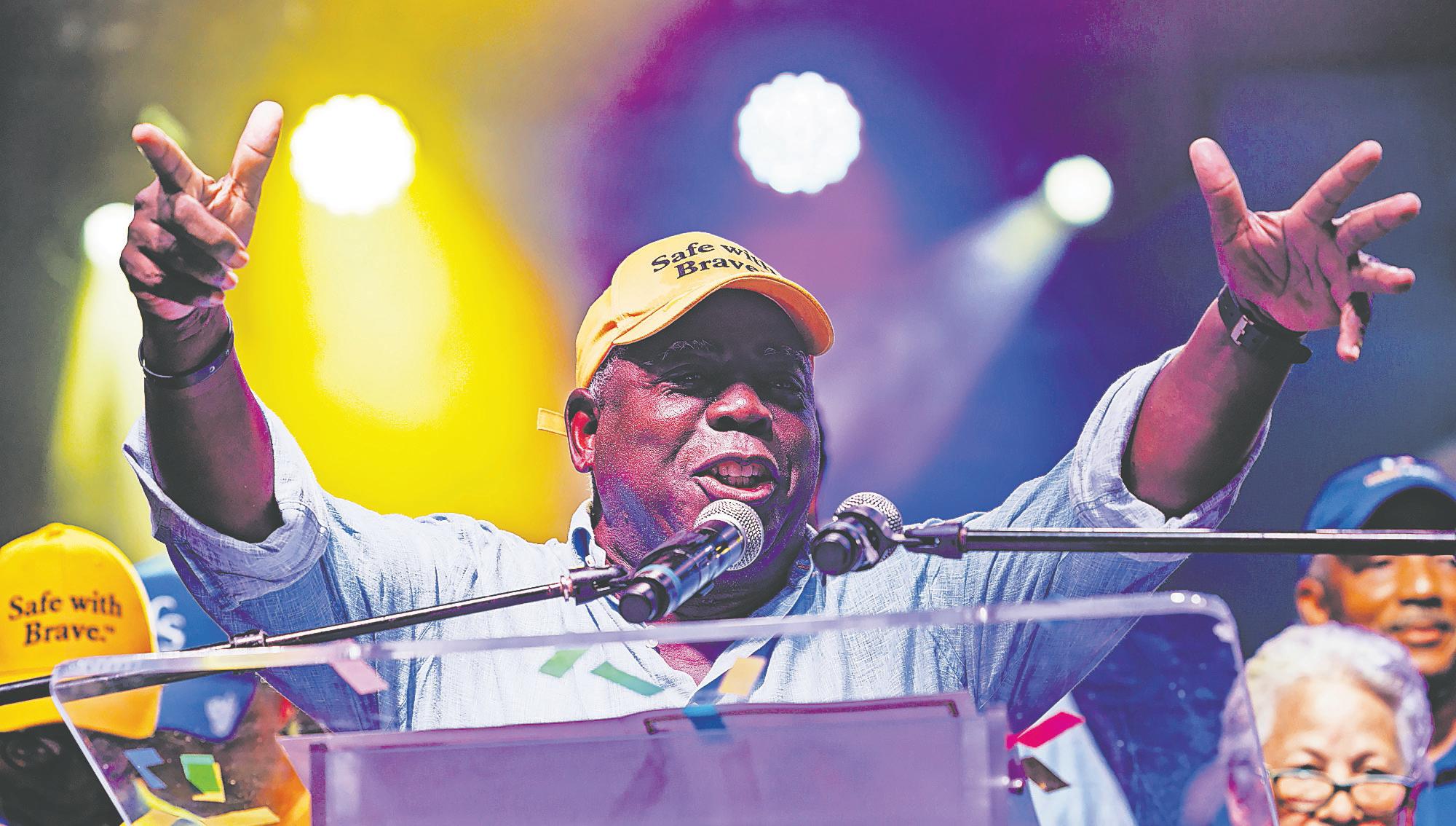
By KEILE CAMPBELL Tribune Staff Reporter
kcampbell@tribunemedia.net
PROGRESSIVE Lib-
eral Party candidate Darren Pickstock has promised a ten-point plan for Golden Isles centred on road repairs, better drainage, improved bus service, and community initiatives such as Read Across Golden Isles, Project Fresh, and the Stay in the Game sports programme.
His announcement comes as the Free National Movement has still yet to say whether it will contest the by-election.
Unveiling his platform at the PLP’s Southwest Link Up rally on Monday night, Mr Pickstock said his campaign will focus on infrastructure and security, education and training, ownership and
empowerment, health and mental wellness, and youth and community development.
The rally, held at Golden Gates Assembly Park, drew hundreds of supporters and several Cabinet ministers, including Prime Minister Philip “Brave” Davis and Deputy Prime Minister Chester Cooper, who both urged voters to return the PLP’s candidate in the November 24 by-election.
Mr Cooper called Mr Pickstock the right choice for the moment, saying his experience in law, business, and public service shows he can deliver. Mr Davis said the BAIC chairman’s quiet diligence makes him the kind of representative Golden Isles needs, warning that the by-election is a choice
between continuing progress or turning back. Health and Wellness Minister Dr Michael Darville and Labour and Public Service Minister Pia Glover-Rolle also addressed the crowd, highlighting the government’s accomplishments in healthcare and labour. Dr Darville spoke about the reopening of the Princess Margaret Hospital’s Accident and Emergency Department and plans for new urgent care clinics, while Mrs Glover-Rolle said public servants will see salary increases by Christmas.
The Golden Isles seat became vacant after the death of former MP Vaughn Miller earlier this year. Mr Pickstock said he hopes to continue Mr Miller’s legacy of community involvement and pledged to be an accessible and active representative if elected.
